Vetted
15 Best Respectful Parenting Books Every Parent Should Read for Positive Parenting
Yearning to improve your parenting skills and strengthen your bond with your child? Discover the top 15 respectful parenting books to transform your approach.

Positive parenting improves with **respectful parenting books** that share awesome tips and tools for strong bonds. **’Respectful Parents, Respectful Kids’** shows how to chat with kindness, while **’How to Talk So Kids Will Listen & Listen So Kids Will Talk’** teaches better talks. **’Elevating Child Care’** guides you on setting boundaries and self-care, which boosts confident parenting. Diving into these books helps parents pick up respect and understanding for happier families. Guess what? These reads can shift how you connect with your children, making family life smooth and fun.
Key Takeaways
- Practical guidance for nurturing compassionate communication.
- Valuable insights for setting boundaries and practicing self-care.
- Focus on respectful parenting to build children's confidence.
- Effective communication strategies for improving parent-child relationships.
- Empowerment and success tips for single mothers and nurturing success in children.
Respectful Parents, Respectful Kids: 7 Keys to Turn Family Conflict into Cooperation
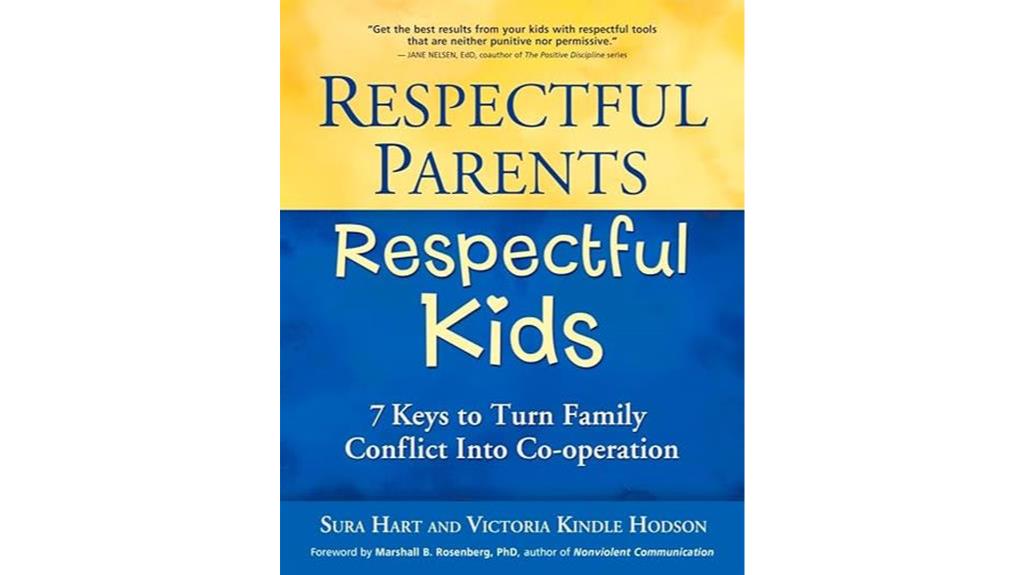
For parents seeking a transformative approach to family dynamics, 'Respectful Parents, Respectful Kids: 7 Keys to Turn Family Conflict into Cooperation' is the ultimate guide. Highly recommended for parents, grandparents, and individuals alike, this book has been hailed as the best parenting resource available.
Its concept and philosophy are deemed essential for everyone to grasp. By offering practical instructions for nurturing compassionate communication with children, it equips families with the tools to reduce conflict and enhance cooperation.
The book's emphasis on Nonviolent Communication (NVC) as the premier conflict resolution method is met with praise, as it guides readers through applying NVC principles effectively at home.
With simple, readable chapters and exercises, it helps create blame-free zones, fostering empathy and understanding within families.
Readers have reported significant improvements in parent-child relationships and a reduction in stress and animosity, making this book a valuable resource for building respectful and cooperative family dynamics.
Best For: Parents, grandparents, and individuals seeking to transform family dynamics and improve communication with children.
Pros:
- Offers practical instructions for nurturing compassionate communication
- Emphasizes the effectiveness of Nonviolent Communication (NVC)
- Provides simple, readable chapters with exercises for practical application
Cons:
- May require consistent effort and practice to fully implement the strategies
- Some readers may find the concepts initially challenging to grasp
- Not a quick-fix solution and may take time to see significant changes
Raising Good Humans: A Mindful Guide to Breaking the Cycle of Reactive Parenting
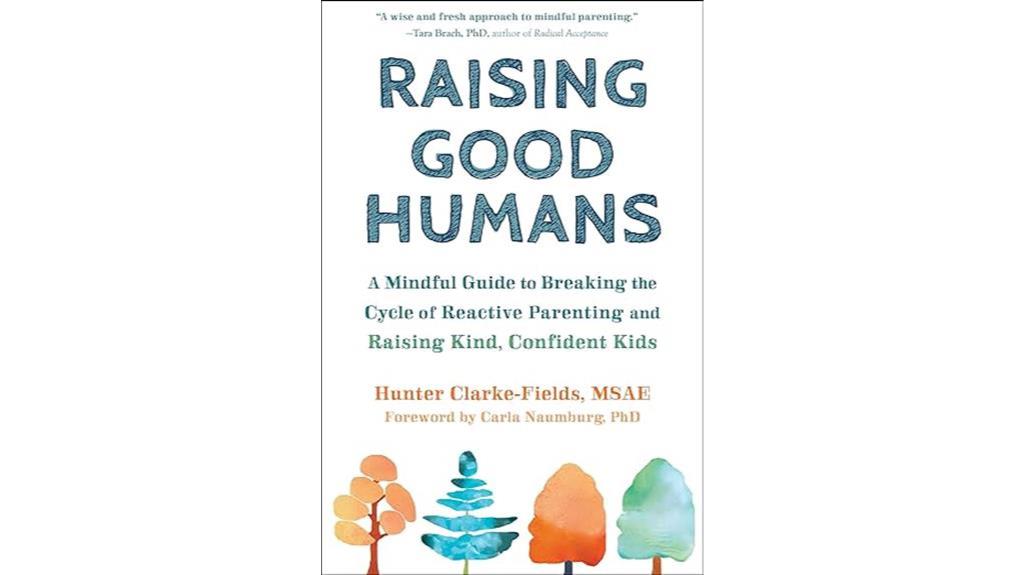
'Raising Good Humans: A Mindful Guide to Breaking the Cycle of Reactive Parenting' stands out as a valuable resource for parents seeking practical strategies to enhance their communication skills with children. The book offers engaging insights and practical tips for effective parenting. It emphasizes mindful approaches to break away from reactive patterns and encourages self-reflection to improve interactions with children.
While some readers find the focus on mindfulness and meditation challenging at first, they acknowledge the benefits of these practices in transforming their parenting style. Personal stories shared in the book resonate with readers, helping them identify triggers and work on enhancing their parenting skills.
Recommendations highlight the book as essential reading for all parents, especially those looking to navigate family challenges with patience and personal growth in mind.
Best For: Parents looking to break free from reactive parenting patterns, enhance communication with their children, and embrace mindfulness in their parenting journey.
Pros:
- Provides valuable insights and practical strategies for effective communication with children.
- Emphasizes the importance of mindfulness and self-reflection in improving parenting skills.
- Offers transformative personal experiences and guidance for parents seeking growth and understanding in their approach.
Cons:
- Some readers may find the focus on mindfulness and meditation challenging initially.
- The book's emphasis on self-work and unlearning past practices may require significant effort.
- Not all readers may resonate with the personal stories shared in the book.
Elevating Child Care: A Guide to Respectful Parenting

The 'Respectful Parenting Books' offer invaluable insights and practical advice for parents seeking to enhance their relationships with their children through Elevating Child Care: A Guide to Respectful Parenting. Elevating Child Care has been widely praised for its positive impact on parent-child dynamics. Readers find the book particularly helpful in understanding the importance of setting boundaries and prioritizing self-care.
Many have expressed feeling more self-assured in their parenting skills after applying the book's teachings. Recommendations and testimonials emphasize the thought-provoking content and practical guidance found in Elevating Child Care. Its principles of respectful parenting are deemed relevant for children of all ages, from infants to adolescents and beyond.
Despite not being a religious text, the book's emphasis on kindness and respect aligns with universal values, making it a valuable resource for parents worldwide.
Best For: Parents looking to improve their relationships with their children through respectful and conscious parenting.
Pros:
- Offers valuable insights and practical advice for setting boundaries and practicing self-care.
- Helps parents feel more confident in their parenting skills.
- Relevant for children of all ages, emphasizing communication and mutual respect in relationships.
Cons:
- Not specifically tailored for parents with specific cultural or religious beliefs.
- Might require dedicated effort and time to fully implement the book's teachings.
- Some readers may find the content too theoretical without enough specific examples.
How to Stop Losing Your Sh*t with Your Kids: A Practical Guide to Becoming a Calmer, Happier Parent

Suitable for parents looking for practical strategies to improve their composure and interaction with their children, 'How to Stop Losing Your Sh*t with Your Kids' provides an invigorating approach to tackling the challenges of parenthood.
The book offers valuable insights and advice in a relatable and easy-to-understand manner, using humorous acronyms like FART and BuRP to make the content memorable. Its conversational, humorous, and compassionate tone resonates with readers, focusing on helping parents manage their reactions rather than solely trying to change their children's behavior.
Positive reviews highlight the book's helpfulness, honesty, and practical advice that's both engaging and easy to implement. While some critiques mention the lack of male perspective and concerns about disrespectful language towards children, overall, the book is commended for its organization, practicality, and relatable writing style.
Best For: Parents seeking practical and relatable strategies to manage their reactions and improve their relationship with their children.
Pros:
- Provides valuable insights and advice in an easy-to-understand manner.
- Uses humorous acronyms to make content memorable.
- Focuses on helping parents understand and manage their own reactions.
Cons:
- Lack of male perspective in the parenting narrative.
- Some readers find the language disrespectful towards children.
- May not address all parenting styles or preferences.
How to Talk So Kids Will Listen & Listen So Kids Will Talk

'How to Talk So Kids Will Listen & Listen So Kids Will Talk' stands out as a valuable tool for parents seeking to enhance their communication skills with their children.
This book offers practical advice and manageable techniques for handling various parenting challenges.
Readers appreciate the fresh perspective it provides, along with practical exercises that help improve their parenting style.
Many find the specific phrases and strategies offered in the book insightful and helpful in real-life situations.
While some critics mention the book has become longer and more intimidating over time, overall, it's highly recommended for parents looking to improve communication with their children.
Additionally, teachers have also found this book beneficial in enhancing their communication skills with students.
Best For: Parents and caregivers seeking practical advice and manageable techniques for improving communication with their children.
Pros:
- Offers practical advice and specific strategies for handling parenting challenges.
- Provides fresh perspectives and practical exercises to enhance parenting styles.
- Valuable for improving communication skills with children and students.
Cons:
- Some readers feel the book has become longer and more intimidating over time.
- Suggestions for a newer, shortened edition without unnecessary filler content.
- Despite minor criticisms, the book is still considered a good read with valuable tips and tricks.
Boy Mom: What Your Son Needs Most from You
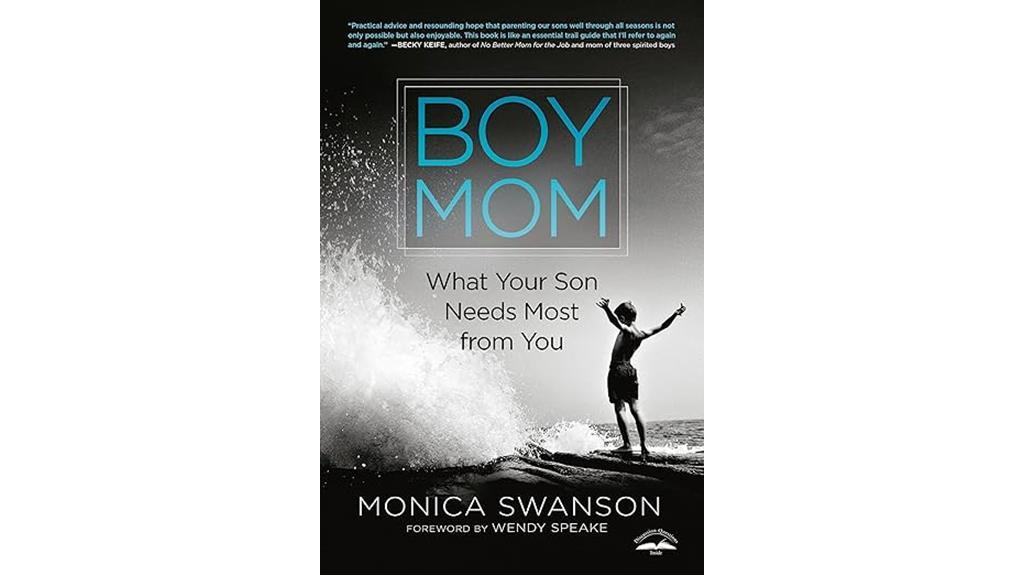
For parents seeking practical guidance and inspiration in nurturing their sons from childhood to adulthood, 'Boy Mom: What Your Son Needs Most from You' is a valuable resource that offers Biblical insights and relatable advice. Readers have found this book to be helpful, inspiring, and practical, providing guidance on various aspects of parenting, including discipline, spiritual, physical, and mental health.
Monica's insights, rooted in faith, are appreciated for their encouragement and relatability. The book emphasizes the importance of love, faith, and intentional parenting, focusing on nurturing children's hearts. It has positively impacted readers' parenting approaches, rejuvenating and empowering them in their mothering journey.
Highly recommended for parents, especially mothers, 'Boy Mom' is praised for its wisdom, practical advice, and transformative impact on parenting children of all ages.
Best For: Parents seeking practical and faith-based guidance in raising sons with a focus on nurturing their hearts and minds.
Pros:
- Offers Biblical insights and practical advice on various aspects of parenting.
- Emphasizes the importance of love, faith, and intentional parenting.
- Provides resources like read-aloud lists and conversation starters for nurturing children.
Cons:
- Might be more geared towards a Christian audience, potentially limiting its appeal to a broader readership.
- Some readers may find certain topics discussed to be too specific or not applicable to their parenting situations.
- The emphasis on faith and spirituality might not resonate with all readers.
No-Drama Discipline: The Whole-Brain Way to Calm the Chaos and Nurture Your Child's Developing Mind
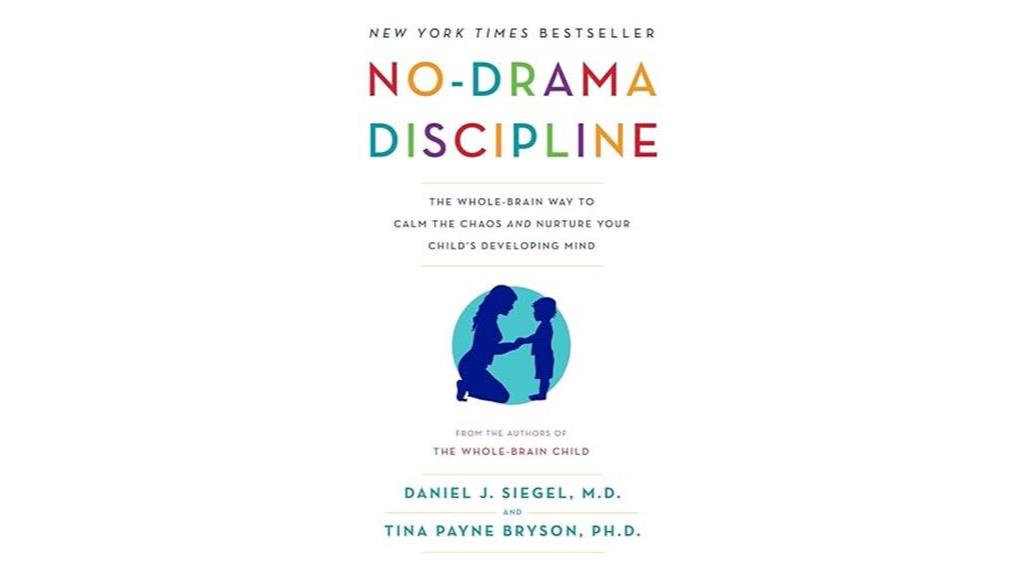
When seeking a transformative approach to discipline and nurturing a child's developing mind, 'No-Drama Discipline: The Whole-Brain Way' is the ideal choice for parents and caregivers. This highly recommended book provides practical tools to transform discipline methods by emphasizing the importance of understanding a child's developing brain.
Readers have found it transformative, challenging existing mindsets and offering fresh perspectives on discipline. The book's impact extends to honing parenting skills, with valuable insights into handling children's behavior effectively.
Recommendations not only endorse 'No-Drama Discipline' but also other works by the authors, praising it as a useful parenting manual with practical strategies. Personal stories highlight its positive impact, reducing drama in parenting and guiding children effectively, especially for parents facing behavior management challenges.
Reviews from various countries reflect its universal appeal, providing practical and helpful tips on discipline and child development.
Best For: Parents and caregivers seeking a transformative and practical approach to discipline and nurturing a child's developing mind.
Pros:
- Provides practical tools to transform discipline methods.
- Emphasizes understanding a child's developing brain.
- Offers valuable insights into handling children's behavior effectively.
Cons:
- May require time and effort to implement the strategies consistently.
- Some techniques may not resonate with all parenting styles.
- Additional support or guidance may be needed for complex behavioral issues.
The Montessori Baby: A Parents Guide to Nurturing Your Baby
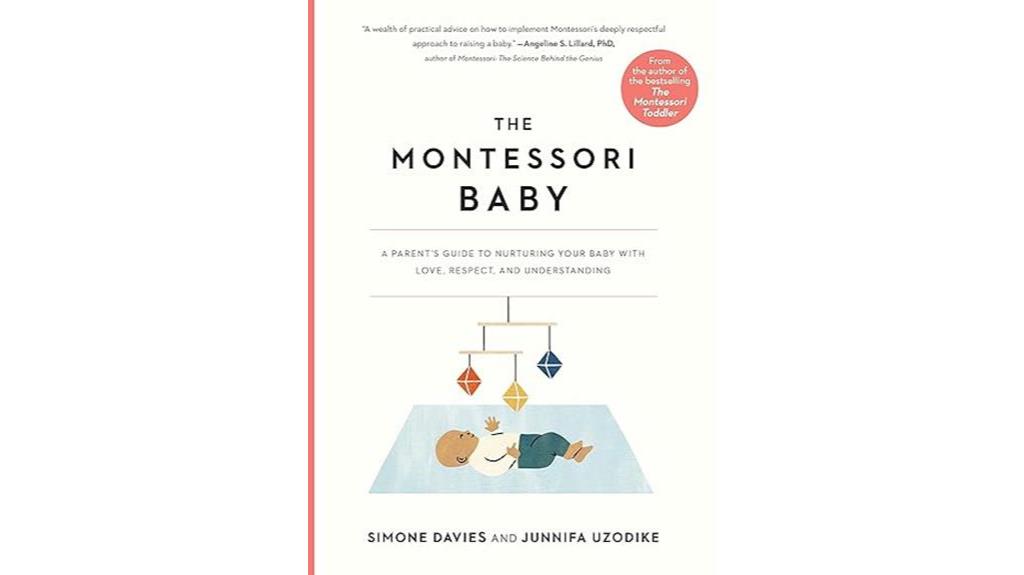
In exploring respectful parenting books, 'The Montessori Baby' stands out as a valuable resource for parents seeking to implement the Montessori method with their infants and toddlers. This book by Simone Davies offers a thorough guide on applying Montessori principles to young children. It focuses on creating a nurturing environment that fosters independence and a love for learning.
One of the strengths of 'The Montessori Baby' is its emphasis on observing and respecting a child's individual development, along with providing practical tips for parents to tailor interactions accordingly. While some readers may find the information repetitive or available online, many appreciate the clear writing style and practical examples within the book.
Overall, 'The Montessori Baby' seems to positively impact parents' understanding and interactions with their children, making it a recommended read for those interested in baby development and the Montessori approach.
Best For: Parents looking to implement the Montessori method with their infants and toddlers.
Pros:
- Emphasizes observation and respect for a child's individual development.
- Provides practical tips for creating a nurturing environment that promotes independence and a love for learning.
- Clear writing style and practical examples make it easy for parents to implement the Montessori approach.
Cons:
- May overwhelm parents new to the Montessori method.
- Some readers may find the information redundant or available online.
- Requires caregivers to be fully invested in the principles outlined in the book, which can pose challenges in certain family dynamics.
No Bad Kids: Toddler Discipline Without Shame

The 'No Bad Kids: Toddler Discipline Without Shame' book is an essential resource for parents seeking effective and respectful ways to manage toddler behavior. This book has garnered high praise for its practical tips and advice on toddler discipline. It emphasizes the importance of respecting children's feelings and maintaining a strong parent-child connection.
Aligned with Magda Gerber's RIE approach, the book focuses on understanding children's behavior and communication. By acknowledging children's feelings, setting clear boundaries, and staying consistent, parents can navigate challenging situations with more patience and empathy.
Readers have reported positive impacts on their parenting practices, with tantrums and meltdowns being deescalated effectively. Despite some minor criticisms about the book's structure, the content remains highly recommended for parents of toddlers and young children.
Best For: Parents of toddlers and young children looking for a respectful and effective approach to toddler discipline.
Pros:
- Practical tips and advice on toddler discipline.
- Emphasizes respecting children's feelings and maintaining a strong parent-child connection.
- Positive impact on parenting practices, helping deescalate tantrums and meltdowns effectively.
Cons:
- Book structure may lack cohesion as it consists of articles from the author's website and podcast.
- Some comments on the physical condition of pre-owned copies, like dog-eared pages.
- Implementing the concepts in emotionally charged situations can be challenging.
The Kickass Single Mom: Be Financially Independent, Discover Your Sexiest Self, and Raise Fabulous, Happy Children

For single mothers seeking empowerment and guidance in achieving financial independence while raising happy children, 'The Kickass Single Mom' by Emma Johnson is a valuable resource. Johnson's book is highly praised for its empowering and inspirational content, with readers noting how it shifted their mindset and helped them overcome challenges.
The emphasis on financial independence is a key aspect, offering practical guidance on setting up finances, legal matters, and future planning. Johnson's no-nonsense approach encourages single mothers to thrive and avoid falling into stereotypes.
In addition to financial advice, the book also provides insights on parenting, co-parenting, and maintaining positive relationships with children. It even offers tips on maneuvering the dating world as a single parent.
Johnson's work, including her blog and Facebook group, has been a supportive community for single mothers, offering encouragement and guidance for those facing uncertainties.
Best For: Single mothers looking for empowering and practical guidance on achieving financial independence and raising happy children.
Pros:
- Empowering and inspirational content that shifts mindsets and helps overcome challenges.
- Practical advice on financial independence, legal matters, and future planning.
- Insights on parenting, co-parenting, and maintaining positive relationships with children.
Cons:
- Some readers suggest addressing more specific scenarios like housing decisions and dating preferences.
- May benefit from more in-depth exploration of certain topics related to single motherhood.
- Not all content may be applicable to every single mother's situation.
Baby Knows Best: Raising a Confident and Resourceful Child, the RIE™ Way
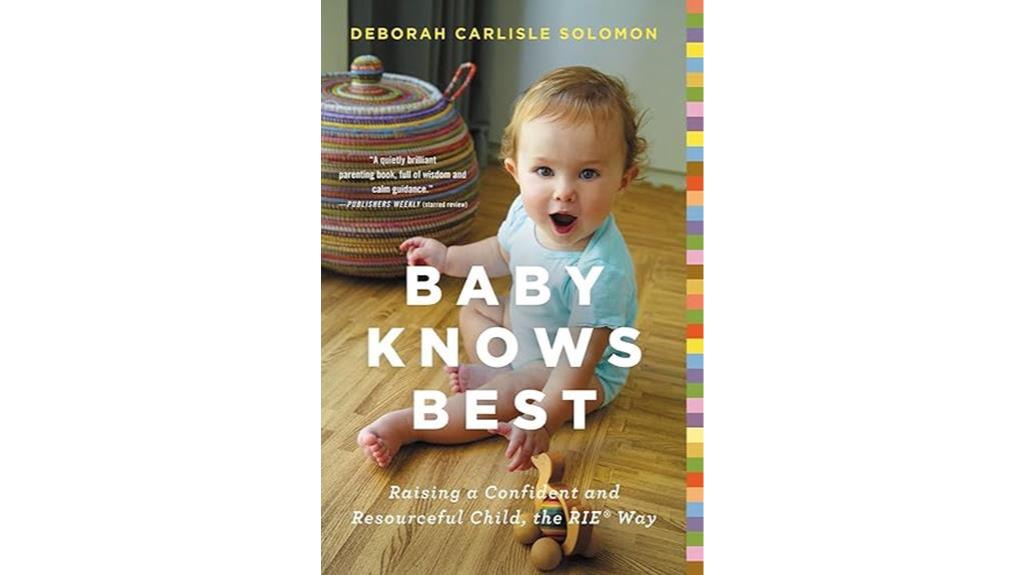
Opt for 'Baby Knows Best: Raising a Confident and Resourceful Child, the RIE™ Way' as the ideal choice for parents seeking a practical and respectful approach to nurturing their child's confidence and reducing parental stress.
This book comes highly recommended for its focus on respectful parenting and building children's confidence while alleviating stress for parents. It offers practical guidance on improving the parent-child relationship, emphasizing observation of babies, allowing them to lead play, and promoting respectful interactions.
The RIE philosophy encourages parents to trust their instincts, praise effort over outcome, and respect their child's competence. Readers have reported feeling more relaxed, enjoying their children, and finding clarity amidst conflicting parenting advice.
Consider this book as a valuable resource for new parents and those interested in deepening their understanding of respectful parenting principles.
Best For: Parents looking to adopt a respectful and practical approach to nurturing their child's confidence and reducing parental stress.
Pros:
- Focuses on respectful parenting and building children's confidence.
- Offers practical guidance on improving the parent-child relationship.
- Encourages parents to trust their instincts and respect their child's competence.
Cons:
- Some readers may feel there is an overemphasis on a single perspective.
- Balancing following guidance and trusting parental intuition may be a challenge for some.
- The need for maintaining a balance between implementing principles and personal instincts is highlighted by reviewers.
The Vital Parenting Skills and Happy Children Box Set: A 5 Full-Length Parenting Book Compilation
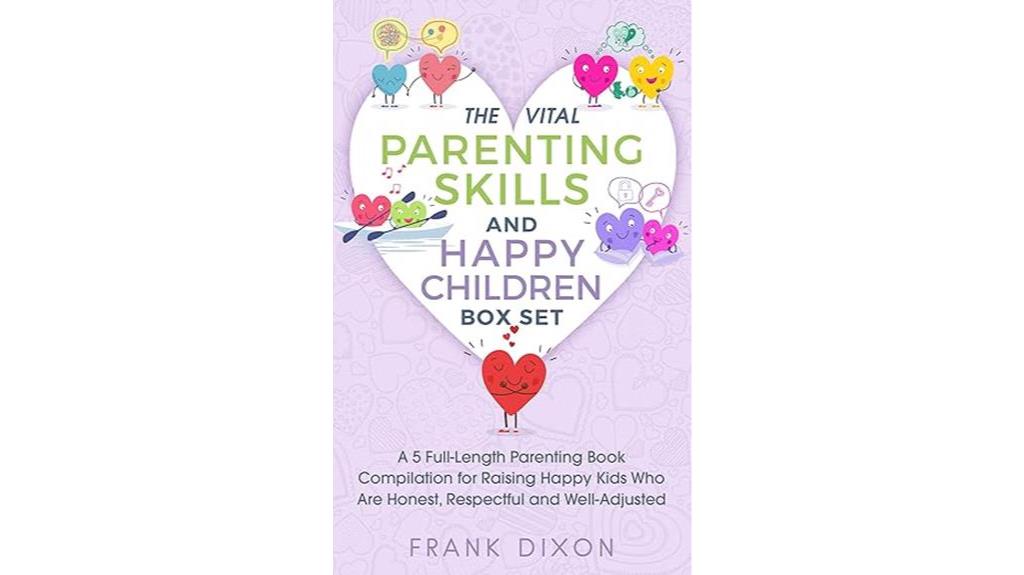
Ideal for parents looking to nurture respectful and happy children, the 'Respectful Parenting Books' compilation by Frank Dixon offers actionable advice on fostering important life skills. This box set consists of 5 full-length parenting books designed to assist in raising children who are honest, joyful, and considerate.
The focus is on effective communication, building self-esteem, and encouraging independence in children aged 0-10 years old. Author Frank Dixon emphasizes the significance of instilling qualities like independence, resilience, and emotional intelligence in children. The chapters cover a wide array of parenting topics, presented in digestible portions with relatable chapter names.
While some readers feel the content leans more towards younger children and lacks focus on preteens and teenagers, the box set still provides valuable insights and practical strategies for parents seeking to enhance their parenting skills.
Best For: Parents of young children (0-10 years old) seeking actionable advice on effective communication, nurturing self-esteem, and fostering independence.
Pros:
- Compilation of 5 full-length parenting books covering a wide range of subjects related to parenting.
- Offers practical strategies to help children work through issues like anxiety.
- Balanced approach with a mix of positive and negative emotions discussed.
Cons:
- Some readers feel the content is more relevant to younger children and lacks focus on preteens and teenagers.
- Desire for more strategies in each chapter for parents.
- Concerns raised about negative vs. positive emotions labeling.
Keep Your Cool When Parenting Teens: 7 Hacks for Healthy Boundaries & Strong Relationship

When maneuvering through the challenges of parenting teenagers, finding effective strategies and maintaining a healthy relationship is essential. The book on parenting teens offers a blueprint emphasizing autonomy balanced with clear boundaries, promoting self-discovery, open dialogue, and constructive guidance. It underlines the significance of mutual respect, establishing family norms, and applying discipline wisely.
Readers praise its well-organized content, wisdom for guiding teens, and actionable steps for parents. Testimonials highlight improved relationships, better communication, and understanding of teenage behavior. The author's approach, focusing on respecting teens' individuality while offering support, resonates well.
Overall, the book is highly recommended for parents traversing the complexities of raising teenagers and fostering strong, lasting bonds with them.
Best For: Parents seeking practical guidance and actionable steps to navigate the complexities of raising teenagers and fostering strong, lasting bonds with adolescents.
Pros:
- Well-written and well-organized content with wisdom for guiding teens.
- Practical advice on various parenting topics like listening, discipline, and decision-making.
- Real-life examples and scenarios for better understanding and application of parenting techniques.
Cons:
- May not offer solutions for every unique parenting situation.
- Some readers may find the guidance repetitive if they are already well-versed in parenting strategies.
- Requires active implementation and consistency to see significant changes in parent-teen relationships.
How To Raise Successful People: Simple Lessons for Radical Results
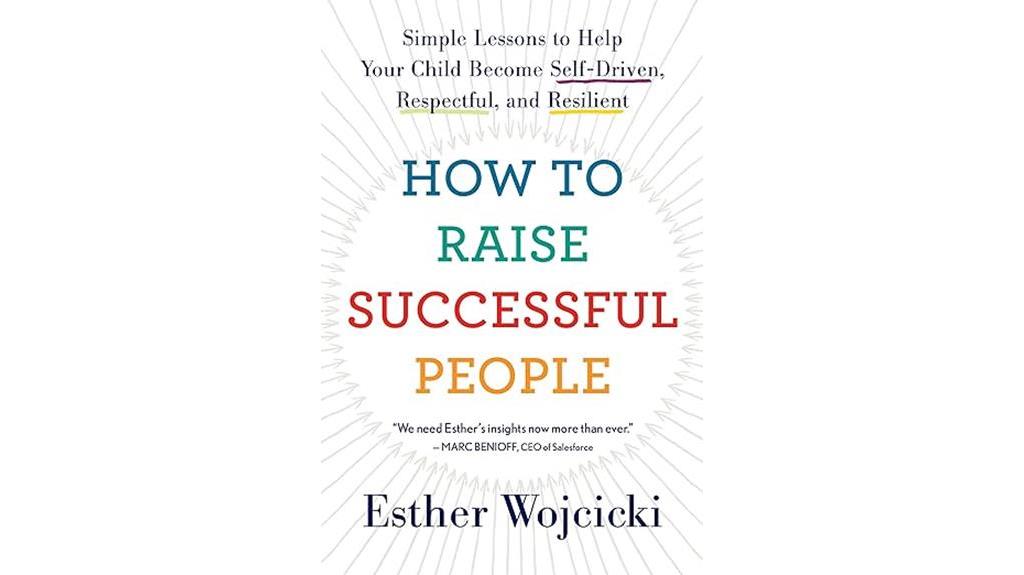
Emphasizing independence and resilience, 'How To Raise Successful People: Simple Lessons for Radical Results' is a pragmatic guide suitable for parents and educators seeking actionable insights on nurturing success in children. The author, Mrs. Wojcicki, blends personal experiences with evidence-based strategies to offer a grounded approach to parenting.
Her TRICK acronym – Trust, Respect, Independence, Collaboration, Kindness – serves as a practical framework for fostering success. While some critics question the narrow definition of success presented through the lens of the author's daughters, many readers find the book valuable for instilling kindness, passion, and confidence in children.
'How To Raise Successful People' is praised for its life-changing impact, motivating parents and teachers to adopt a philosophy of parenting that prioritizes character development alongside achievements.
Best For: Parents and educators seeking a holistic approach to nurturing success and character development in children.
Pros:
- Offers a practical framework (TRICK acronym) for fostering independence and resilience.
- Blends personal anecdotes with evidence-based strategies for a well-rounded guide.
- Emphasizes instilling kindness, passion, and confidence alongside traditional measures of success.
Cons:
- Some may question the narrow definition of success presented through the author's daughters.
- Criticisms of perceived bragging about the author's children's achievements may deter some readers.
- Concerns about the secular aspects of success highlighted in the book may not align with all readers' beliefs.
Setting Limits with Your Strong-Willed Child, Revised and Expanded 2nd Edition
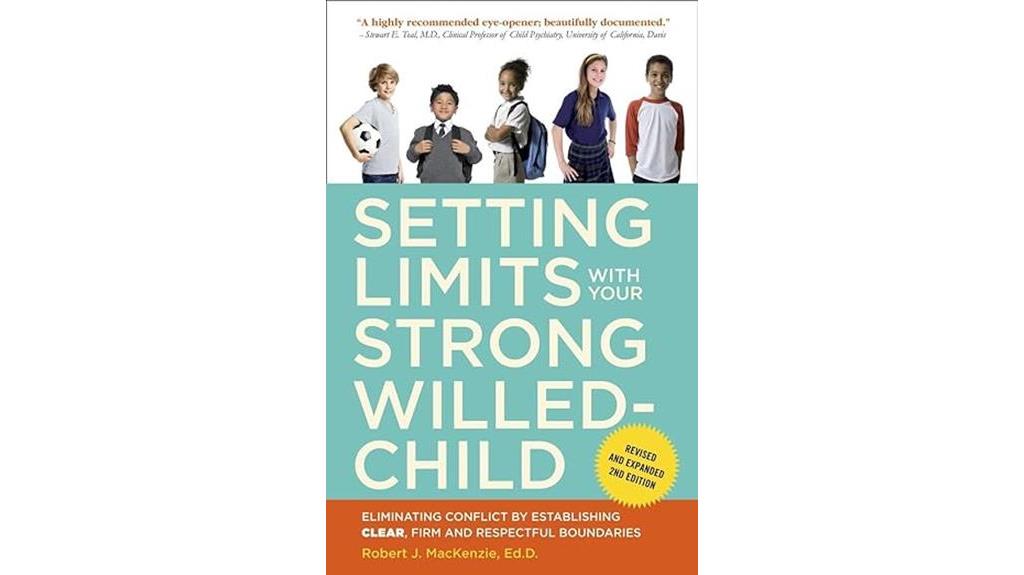
For parents seeking practical strategies to establish clear boundaries and foster respect in their relationship with a strong-willed child, the 'Setting Limits with Your Strong-Willed Child, Revised and Expanded 2nd Edition' is a valuable resource.
This book has received positive reviews for its impact on parenting, with many noting improvements in their child's behavior and a reduction in conflicts.
It offers effective solutions for common challenges faced by parents of strong-willed children, such as power struggles and ineffective discipline methods. By emphasizing tools and techniques for managing behavior and promoting respectful discipline, this book equips parents with the necessary skills to navigate challenging situations.
Readers have found the advice on firm boundaries, logical consequences, and consistent enforcement particularly beneficial in improving their family dynamics.
Best For: Parents of strong-willed children seeking practical strategies for establishing boundaries and fostering respect in their relationship.
Pros:
- Provides practical techniques for managing behavior and reducing conflicts.
- Offers effective solutions for common challenges faced by parents of strong-willed children.
- Emphasizes tools for promoting respectful discipline and improving family dynamics.
Cons:
- May require consistent implementation for lasting results.
- Some strategies may not work for every child or family dynamic.
- Could be overwhelming for parents who prefer a more lenient approach.
Factors to Consider When Choosing Respectful Parenting Books

When selecting respectful parenting books, it's essential to evaluate the author's approach, ensuring it aligns with your values and beliefs.
Examining the compatibility of the parenting style advocated in the book with your own can help in applying the advice effectively.
Additionally, looking for research-based content, practical strategies, and positive discipline techniques can further enhance the book's value in supporting your parenting journey.
Author's Approach
What key factors should we keep in mind when selecting respectful parenting books based on the author's approach?
It's important to examine how authors approach parenting, whether they emphasize empathy, effective communication, discipline strategies, or follow a specific parenting philosophy. Authors who provide practical tools and strategies aligned with your parenting style and goals can be particularly helpful.
Evaluating if the author's approach resonates with your values and beliefs about raising children is significant. It's also important to ponder if the author's methods are evidence-based, backed by research, or derived from real-life experiences. Opting for authors who emphasize mutual respect, understanding children's needs, and fostering positive parent-child relationships can be enlightening.
Additionally, considering how authors explain parenting challenges and provide relatable, sensible solutions is key. Choosing books that integrate real-life examples and insights, especially when dealing with the teenage years, can offer valuable guidance in handling difficult situations effectively.
Lastly, taking into account the author's writing style for readability, relevance, and actionable strategies is essential to make sure the book aligns with your parenting goals.
Parenting Style Compatibility
Considering our parenting beliefs and values is essential when selecting respectful parenting books that align with our preferred approach. It's vital to choose books that resonate with our parenting goals and objectives.
Look for titles that offer strategies and techniques complementing your preferred parenting style. Evaluate how the book's methods can be integrated into your current parenting practices for practical application. Confirm the recommendations provided are feasible for your family dynamics.
Assess if the book's approach to respectful parenting aligns with your desired outcomes for your child's development. Seek practical strategies and techniques that you can realistically implement in your parenting journey.
Evaluate how the book addresses challenges specific to your parenting situation, such as dealing with strong-willed children or communication issues. Check if the book provides a balanced perspective on fostering independence while maintaining a strong parent-child bond.
Compatibility between the parenting style advocated in the book and your personal beliefs and values is key for a harmonious and effective parenting journey.
Research-Based Content
To guarantee we select effective and credible respectful parenting books, prioritizing research-based content is crucial. When choosing a book, look for ones that are supported by research and evidence-based practices in child development and parenting.
It's vital to take into account books that cite reputable sources, studies, and experts in the field of psychology and education. Checking the author's background in child psychology, education, or a related field can help confirm the information provided is reliable.
Opt for books that offer practical strategies and techniques grounded in research on effective parenting, such as scientifically proven methods for improving parent-child communication, conflict resolution, and relationship building. By selecting books with research-based content, readers can gain a deeper understanding of the psychology behind respectful parenting approaches and their effectiveness.
These books can provide practical tools and techniques that are proven to promote healthy parent-child relationships based on respect, instilling confidence in implementing respectful parenting strategies supported by scientific evidence.
Practical Strategies Offered
Exploring the practical strategies provided in respectful parenting books can equip parents with actionable tools for enhancing their relationships with their children and promoting positive communication dynamics within the family. These books offer a range of techniques, including effective communication methods, conflict resolution strategies, and guidance on setting healthy boundaries. By incorporating exercises, examples, and activities, parents can actively implement respectful parenting practices in their daily interactions with their children.
The focus lies on cultivating empathy, understanding children's needs, and fostering cooperation within the family unit. Practical guidance found in these books emphasizes creating a blame-free environment, enhancing communication skills, and decreasing conflicts. Additionally, parents can learn how to build respectful, compassionate, and cooperative relationships with their children through the tools provided. Some books may specifically address parent-teen relationships, while others offer insights on setting clear boundaries and promoting mutual respect, even with strong-willed children.
These resources also cover managing power struggles, encouraging independence, and instilling kindness in parenting approaches, all aimed at nurturing successful children through positive discipline and reinforcement techniques.
Positive Discipline Techniques
In exploring respectful parenting books, one must consider the incorporation of positive discipline techniques that prioritize teaching children appropriate behavior through guidance and mutual respect.
Positive discipline techniques focus on guiding children towards positive choices by setting clear expectations, providing consequences for actions, and emphasizing respectful communication. These methods encourage parents to understand and validate their child's feelings while teaching effective emotional management.
By creating a nurturing and supportive environment, positive discipline promotes mutual respect and problem-solving skills to address behavior issues. It emphasizes using logical consequences, positive reinforcement, and empathy to encourage desired behaviors rather than resorting to punishment.
Implementing positive discipline techniques can lead to improved self-esteem, emotional regulation, and cooperation in children. By choosing parenting books that highlight these techniques, parents can enhance their parenting skills and cultivate a positive relationship with their children based on understanding, respect, and effective communication.
Child Development Insight
Understanding child development stages is an essential factor to take into account when selecting respectful parenting books. Insight into cognitive, emotional, and social development helps tailor parenting approaches to meet children's evolving needs. By knowing developmental milestones, parents can set appropriate expectations and adapt their strategies accordingly.
Recognizing individual differences in children's development guides parenting practices, fostering a more personalized approach. Applying child development research not only enhances communication but also aids in building stronger relationships with children. When choosing a respectful parenting book, it's important to contemplate resources that offer insights into how children think, feel, and behave at different stages of development.
Look for books that provide evidence-based strategies for supporting healthy emotional, cognitive, and social growth in children. Seek resources that emphasize respecting children's individuality and autonomy within the context of their developmental capabilities. Opt for books that address common parenting challenges through the lens of child development, offering practical guidance on nurturing respectful relationships with children at each developmental stage.
Communication Skills Building
When selecting respectful parenting books, we prioritize those that focus on building effective communication skills between parents and children. These books offer valuable guidance on fostering empathy, understanding, and cooperation through communication.
By providing practical strategies and tools, they help improve family dynamics and relationships. Emphasizing the importance of active listening, expressing emotions, and resolving conflicts peacefully, these resources assist parents in developing a language that promotes mutual respect and understanding within the family unit.
Effective communication techniques highlighted in these books include strategies for improving listening skills, empathy, and understanding in parent-child interactions. They also provide practical tips for fostering open and honest communication within family relationships.
Communication building in respectful parenting involves active listening, validating feelings, and promoting dialogue, all of which help parents establish trust and strengthen connections with their children.
Cultural Sensitivity Included
Considering diverse family backgrounds and values, it's crucial to prioritize culturally sensitive content when selecting respectful parenting books. Cultural sensitivity guarantees that parenting advice resonates respectfully across various cultural norms and practices.
By incorporating cultural perspectives, these books can make readers from different backgrounds feel understood and represented. Emphasizing cultural sensitivity in parenting literature promotes inclusivity and a deeper understanding of diverse parenting approaches.
Recognizing and respecting cultural differences in these books nurtures empathy and appreciation for the range of family dynamics and traditions that exist. When choosing parenting resources, look for those that acknowledge diverse family structures, traditions, and values.
Opt for books that offer practical guidance on understanding cultural differences and fostering inclusivity in parenting approaches. Select resources that highlight respect for various cultural backgrounds and encourage open communication within diverse families.
Seek out materials that provide strategies for comprehending and honoring cultural nuances in parenting interactions and discipline. Prioritizing empathy, understanding, and acceptance of diverse cultural perspectives is key to raising children with respect.
Frequently Asked Questions
How Can I Handle Power Struggles With My Child Effectively?
When handling power struggles with children, it is helpful to set clear boundaries and expectations. Consistency is key in enforcing these rules, ensuring that consequences are fair and proportional to the behavior.
By offering choices within the boundaries we've set, we empower our children to make decisions, reducing the likelihood of power struggles.
Communication is essential; listening to their perspective and validating their feelings can also diffuse tensions effectively.
Are There Specific Techniques for Promoting Positive Behavior in Children?
When promoting positive behavior in children, consistency is key. Setting clear expectations and boundaries helps kids understand what's expected of them.
Positive reinforcement for good behavior encourages them to continue making positive choices. Using effective communication and active listening builds trust and fosters a supportive environment.
Modeling the behavior you want to see in your children is also influential. By staying patient and consistent, we can help shape positive behavior in our kids.
What Are Some Strategies for Maintaining Calm and Patience as a Parent?
Staying calm and patient as parents involves setting realistic expectations, practicing self-care, and utilizing effective communication.
Taking breaks when needed, using deep breathing techniques, and seeking support from a partner or trusted individual can also help manage stress.
It's important to remember that it's okay to make mistakes and to prioritize self-compassion.
How Do I Address Challenging Behaviors Without Resorting to Punishment?
When addressing challenging behaviors without resorting to punishment, we find that setting clear expectations and consistent boundaries is key.
By calmly explaining the desired behavior and redirecting negative actions towards positive alternatives, we can guide our children towards understanding and cooperation.
Positive reinforcement, such as praise and rewards for good behavior, can further encourage positive outcomes.
It's important to remember that patience and consistency are essential in shaping behavior positively.
Can These Parenting Books Help Improve Communication Within My Family?
Yes, these parenting books can definitely improve communication within families. They offer practical strategies and techniques to enhance understanding and connection.
By emphasizing respectful dialogue and active listening, these books can help foster open communication channels among family members.
Implementing the advice and tools provided in these resources can lead to more effective and harmonious interactions, ultimately strengthening family bonds and relationships.
Are Respectful Parenting and Mindful Parenting the Same Approach to Parenting?
Respectful parenting and mindful parenting share some similar principles, but they are not the same approach to parenting. While both focus on empathy and understanding, respectful parenting emphasizes mutual respect between parent and child, while mindful parenting promotes being present and nonjudgmental. For more insights, consider reading the best books for mindful parenting.
Conclusion
To sum up, reading respectful parenting books can provide valuable insights and strategies for positive parenting.
While some may argue that every child is different and requires unique approaches, these books offer a foundation of knowledge and techniques that can be adapted to suit individual needs.
By incorporating the principles of respectful parenting, parents can foster a strong and healthy relationship with their children based on mutual respect and understanding.
Vetted
14 Best Self-Help Parenting Books Every Parent Should Read for a Happier Family
Leverage the power of self-help parenting books to transform your family dynamics and cultivate a happier home – discover essential insights and strategies within!

**Hunting for a happier family?** Check out the ’14 Best Self-Help Parenting Books’ for practical advice and smart strategies. Books like ‘How to Stop Losing Your Sh\*t with Your Kids,’ ‘Raising Good Humans,’ and ‘Parenting from the Inside Out’ help with building self-awareness, mindful parenting, and personal growth. Also, ‘The 7 Habits of Highly Effective Teens,’ ‘Moms Moving On,’ and ‘Teen Girls Survival Guide’ offer extra support. These guides provide tools to handle tough times and improve family vibes. They aim to give parents a richer, more joyful parenting journey.
Key Takeaways
- Consider author credentials and expertise for credible advice.
- Select books with practical strategies and tangible techniques.
- Look for alignment with your parenting style and values.
- Choose books that offer actionable advice for specific challenges.
- Prioritize books that foster personal growth and positive parenting practices.
How to Stop Losing Your Sh*t with Your Kids: A Practical Guide to Becoming a Calmer, Happier Parent

For parents seeking practical solutions to manage stress and improve their parenting skills, 'How to Stop Losing Your Sh*t with Your Kids' offers valuable insights and strategies. This book has garnered positive reviews for its relatable and easy-to-understand content. Readers appreciate the author's humorous acronyms and conversational tone, making the advice both helpful and engaging.
The author's writing style is described as honest and compassionate, resonating well with readers looking for realistic solutions to parenting challenges. Additionally, the book's focus on self-awareness and self-control has helped many readers gain a new perspective on their parenting approach.
While some critiques mention the lack of addressing men's roles in parenting and concerns about language use, overall, 'How to Stop Losing Your Sh*t with Your Kids' seems to have a positive impact on readers' self-perception and parenting skills.
Best For: Parents looking for a practical and humorous guide to improve their parenting skills and reduce stress levels.
Pros:
- Relatable and easy-to-understand content.
- Author's humorous acronyms and conversational tone keep readers engaged.
- Emphasis on self-awareness and self-control for personal growth in parenting.
Cons:
- Lack of addressing men's roles in parenting.
- Some readers find the language disrespectful towards children.
- Organizational issues mentioned by some critiques.
Raising Good Humans: A Mindful Guide to Breaking the Cycle of Reactive Parenting
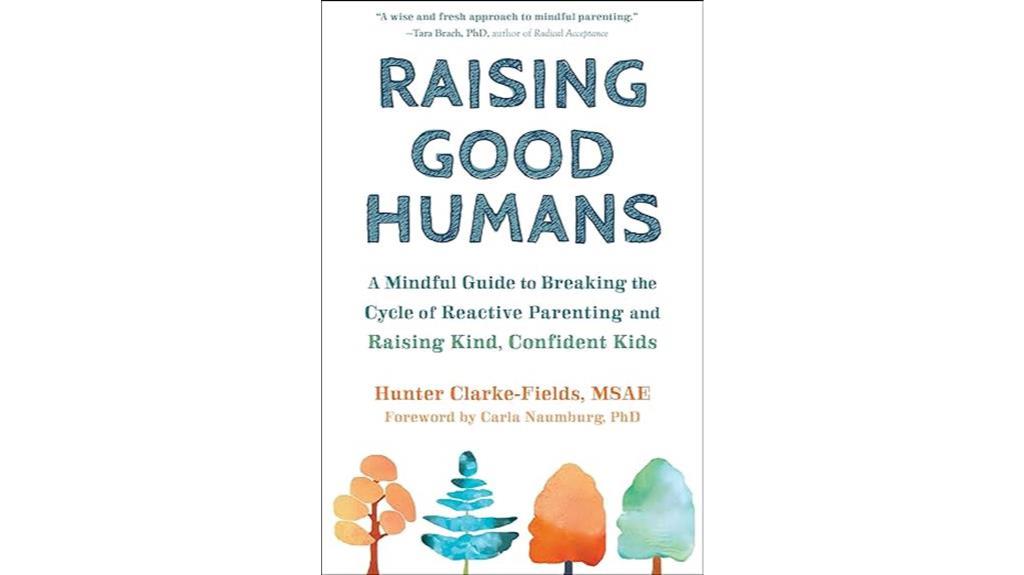
'Raising Good Humans: A Mindful Guide to Breaking the Cycle of Reactive Parenting' offers practical strategies for transforming parenting habits and fostering healthier family dynamics. This book has garnered positive reviews and recommendations from readers who found it insightful and valuable.
Many parents, especially first-timers, appreciate the engaging way it delivers essential information. Readers highlight the importance of self-work and patience in parenting, emphasizing its impact on parenting approaches. By providing effective strategies, the book helps parents handle challenging moments with children and break the cycle of reactive parenting.
While some readers faced challenges unlearning their upbringing, the emphasis on self-work and mindfulness practices proves beneficial. Personal experiences shared reveal how the book aids in identifying triggers, working through underlying issues, and promoting self-reflection for improved parenting.
Specific techniques like I language and win-win discussions, alongside mindfulness practices, equip parents to tackle parenting challenges more effectively.
Best For: Parents seeking to break the cycle of reactive parenting and cultivate mindful and effective parenting practices.
Pros:
- Insightful and valuable information presented in an engaging manner.
- Effective strategies for handling challenging moments with children.
- Encourages self-work, mindfulness practices, and self-reflection for improved parenting.
Cons:
- Some readers may find unlearning their upbringing challenging.
- Initial difficulty in approaching mindfulness practices for a few readers.
- The emphasis on self-work and patience in parenting may require a significant commitment.
Parenting from the Inside Out: How a Deeper Self-Understanding Can Help You Raise Children Who Thrive
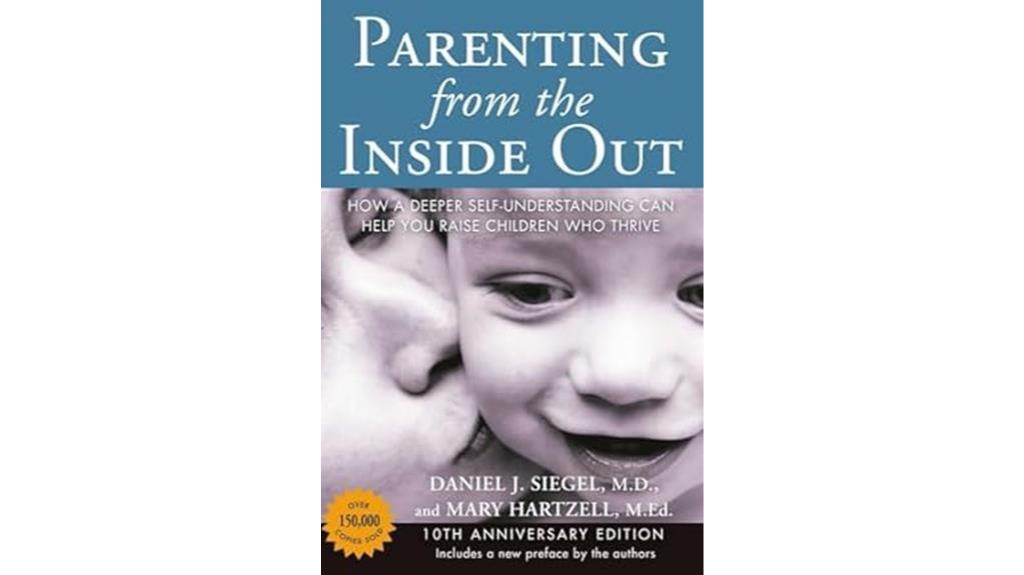
In my experience, 'Parenting from the Inside Out' is a transformative read for individuals seeking to understand themselves deeply while nurturing thriving children. This book explores the connection between a parent's own emotional experiences and their parenting style, emphasizing the importance of self-awareness in raising children.
By investigating how our past influences our present behaviors, readers can gain valuable insights into breaking negative cycles and fostering healthier relationships with their children. The integration of personal anecdotes, professional insights, and scientific research makes this book both engaging and informative.
Through exercises and practical guidance, 'Parenting from the Inside Out' offers a roadmap for personal growth and self-understanding, ultimately leading to more fulfilling and effective parenting practices.
Best For: Parents and individuals seeking to deepen their self-understanding to improve their parenting skills and nurture thriving children.
Pros:
- Integrates personal anecdotes, professional insights, and scientific research for a comprehensive understanding.
- Offers practical exercises and guidance for personal growth and self-understanding.
- Provides valuable insights into breaking negative cycles and fostering healthier parent-child relationships.
Cons:
- May require deep introspection and emotional exploration, which can be challenging for some readers.
- The depth of psychological insights may be overwhelming for those seeking a more surface-level parenting guide.
- Not a quick-fix solution, as implementing the strategies and concepts requires ongoing effort and self-reflection.
The 7 Habits of Highly Effective Teens
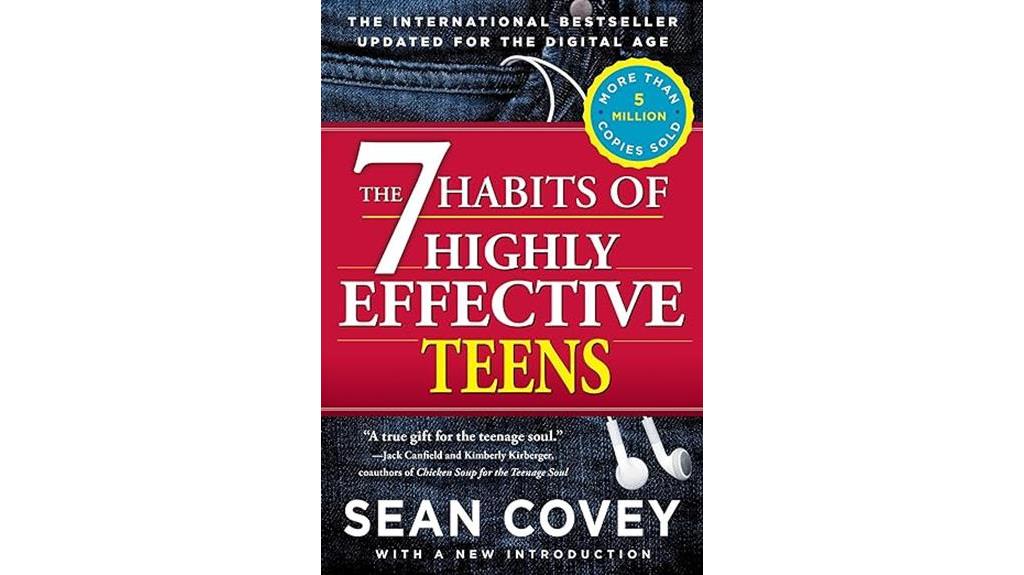
One essential resource for nurturing a harmonious family dynamic is exploring 'The 7 Habits of Highly Effective Teens.' This book offers practical advice and logical tips for teen success, making it impactful and life-changing for readers of all ages.
It's highly recommended for teenagers and young people, serving as a great starting point for personal development. With fantastic student takeaways in high school health classes and positive feedback from readers, this book is ideal for reluctant readers due to its creative approaches.
Whether introduced to teens at a young age or gifted to adolescents, 'The 7 Habits of Highly Effective Teens' is a compact and handy resource containing wonderful concepts for habit development, reflection on personal goals, and behavioral improvements.
Best For: Teens and adolescents seeking practical advice and tips for personal development in a compact and easy-to-understand format.
Pros:
- Highly educative and informative for young readers.
- Impactful and life-changing content suitable for teenagers.
- Great starting point for habit development and reflection on personal goals.
Cons:
- Some may find the book too small in size.
- May not appeal to readers looking for in-depth analysis or lengthy content.
- Limited scope for advanced personal development strategies.
Moms Moving On: Real Life Advice on Conquering Divorce, Co-Parenting Through Conflict, and Becoming Your Best Self

For moms managing divorce, co-parenting challenges, and seeking personal growth, 'Moms Moving On' offers invaluable real-life advice and support. This book provides practical tips, humor, and guidance for handling the complexities of divorce and co-parenting conflicts.
Readers praise the author, Michelle, for her relatable experiences and insightful advice, finding comfort and encouragement in her words. 'Moms Moving On' is highly recommended for those going through or considering divorce, as well as for individuals supporting loved ones on this journey.
The impact of this book is evident in the gratitude expressed by readers for its role in their healing process and its ability to address fears and offer hope. Michelle's writing style fosters a sense of connection and understanding, making 'Moms Moving On' a valuable companion for those facing divorce and co-parenting challenges.
Best For: Individuals navigating divorce, co-parenting challenges, and seeking personal growth.
Pros:
- Offers real-life advice and practical tips for handling divorce and co-parenting conflicts.
- Author's relatable experiences and insightful advice provide comfort and encouragement.
- Highly recommended for those going through or considering divorce, as well as for support systems.
Cons:
- May not address all specific individual situations.
- Some readers may find the content emotionally challenging.
- Limited focus on legal aspects of divorce and co-parenting.
Atomic Habits: An Easy & Proven Way to Build Good Habits & Break Bad Ones

Parents seeking practical strategies to improve family dynamics and foster a happier household will find 'Atomic Habits: An Easy & Proven Way to Build Good Habits & Break Bad Ones' an invaluable resource. In this book, author James Clear shares personal insights and strategies to help readers understand how habits impact life outcomes.
By focusing on making small changes that compound over time, individuals can achieve remarkable results. Clear emphasizes the importance of identity-based habits for lasting change and breaks down the behavior change process into cues, cravings, responses, and rewards.
Practical tips on building good habits include leveraging cues, creating attractive opportunities, making habits easy, and ensuring habits are satisfying. By implementing the principles outlined in 'Atomic Habits,' families can work towards creating a positive and fulfilling environment together.
Best For: Individuals seeking practical strategies to improve their habits and transform their life outcomes.
Pros:
- Provides actionable insights and strategies for building good habits and breaking bad ones.
- Emphasizes the importance of identity-based habits for lasting change.
- Offers practical tips on making habits attractive, easy, and satisfying for long-term success.
Cons:
- May require consistent effort and commitment to see significant results.
- Some strategies may not resonate with every individual's lifestyle or preferences.
- Implementing all the recommended habits simultaneously could be overwhelming for some people.
The Worlds Best Dad During and After Divorce: A Guide to Co-Parenting for Divorced Dads

Amidst the challenges of divorce, this guide equips fathers with practical strategies to navigate co-parenting complexities and maintain a positive presence in their children's lives. The book offers a thorough approach, addressing key aspects like communication, conflict resolution, and creating a balanced home environment.
It empowers divorced dads to handle the difficulties of divorce with grace and positivity, ensuring they continue to play influential and loving roles in their children's lives. Reader feedback appreciates the book's focus on fathers and its easy-to-understand tone, making it a valuable resource for dads seeking guidance during and after divorce.
While some readers noted gaps in handling unique situations, the book overall provides insightful perspectives on co-parenting, emphasizing the well-being of children. Personal experiences shared by readers highlight the book's role in maintaining focus and offering guidance on priorities during the divorce journey.
Recommendations suggest that individuals going through divorce can benefit from the book's practical ideas and suggestions, helping them stay focused on being the best dads they can be. Overall, the long-term impact of this guide is seen in its enduring value years after divorce, emphasizing the importance of maintaining a positive environment for children and prioritizing fatherhood.
Best For: Dads who are navigating the challenges of divorce and seeking practical guidance on co-parenting to maintain a positive relationship with their children.
Pros:
- Offers practical strategies and real-life advice for divorced dads.
- Addresses key aspects of co-parenting like communication and conflict resolution.
- Empowers fathers to handle divorce challenges with grace and positivity.
Cons:
- May have gaps in addressing unique or challenging circumstances.
- Some readers might find the information not comprehensive enough for all scenarios.
- Could benefit from more in-depth strategies for specific co-parenting situations.
How to Talk So Kids Will Listen & Listen So Kids Will Talk

When seeking practical strategies to enhance communication with children, exploring 'How to Talk So Kids Will Listen & Listen So Kids Will Talk' can greatly benefit one's parenting approach. This book offers clear and manageable advice on relevant parenting issues, encouraging reflection and mindset shifts in parenting styles.
Readers appreciate the helpful exercises and techniques provided, finding them easy to apply to different parenting situations. It includes specific words and phrases for parents to use in challenging moments, fostering effective communication with kids. Many readers highly recommend the book for its practical and encouraging approach to gentle parenting.
Despite some finding the book overly long, it's acknowledged for its practical tips and tricks for improving parent-child communication. Overall, 'How to Talk So Kids Will Listen & Listen So Kids Will Talk' is a valuable resource for parents looking to enhance their communication skills with children.
Best For: Parents seeking practical and effective strategies for improving communication with their children.
Pros:
- Clear and manageable advice on relevant parenting issues.
- Helpful exercises and techniques for different parenting situations.
- Encourages reflection and mindset shifts in parenting styles.
Cons:
- Some readers may find the book overly long and intimidating.
- Suggestions for a newer, shortened edition without unnecessary filler have been made.
- Despite some criticism, the book still offers practical tips and strategies for parent-child communication.
The Book You Wish Your Parents Had Read

For those seeking a candid and empathetic guide to parenthood that explores unconventional wisdom and emphasizes emotional connection, 'The Book You Wish Your Parents Had Read' by Philippa Perry is a valuable resource.
This book delves into the emotional aspects of parenting, prompting reflection on our upbringing and offering practical tools for enhancing communication and empathy within the family. Perry's approach, which views children as individuals with whom we've lifelong relationships, presents a fresh perspective compared to traditional parenting advice.
Readers have found this book instrumental in understanding their parenting styles, fostering healthier relationships, and making positive changes in their interactions with their children. Additionally, individuals who've faced emotional abuse or difficult parenting situations have found solace and guidance in 'The Book You Wish Your Parents Had Read', making it a recommended read for those seeking to nurture empathetic and loving relationships with their children.
Best For: Parents and caregivers seeking a compassionate and insightful guide to parenting that prioritizes emotional connection and empathy.
Pros:
- Encourages reflection on parenting styles and upbringing
- Offers practical tools for building communication and empathy within the family
- Provides a fresh perspective on viewing children as individuals with lifelong relationships
Cons:
- Contains sections that are opinion-based rather than solely research-based
- Some readers find a mix of insightful concepts and common knowledge, leading to varying degrees of factual information
- May not resonate with individuals looking for a strictly traditional parenting approach
Baby Knows Best: Raising a Confident and Resourceful Child, the RIE™ Way
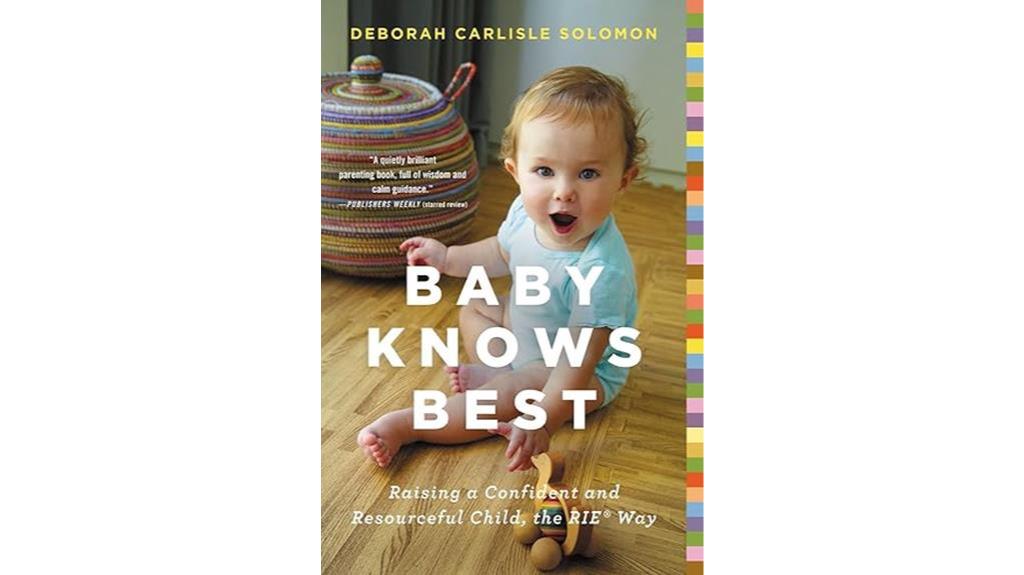
The book 'Baby Knows Best: Raising a Confident and Resourceful Child, the RIE™ Way' is a must-have for parents and professionals looking to adopt a child-led approach to parenting. This book emphasizes the RIE philosophy, which focuses on promoting children's independence and self-confidence.
By encouraging children to explore and problem-solve on their own, parents can support their natural development and foster a sense of autonomy. The RIE principles highlighted in the book include praising effort over achievement, acknowledging feelings, and providing a safe environment for self-directed play.
Implementing these strategies can lead to reduced parental stress, stronger parent-child connections, and improved communication skills. 'Baby Knows Best' offers practical guidance for respectful parenting, making it a valuable resource for anyone looking to enhance their parenting skills and create a happier family dynamic.
Best For: Parents and professionals seeking a child-led approach to parenting that emphasizes independence and self-confidence.
Pros:
- Practical guidance for implementing RIE philosophy in parenting.
- Positive impact on parent-child relationships and communication.
- Focus on fostering children's autonomy and problem-solving skills.
Cons:
- May require a shift in mindset for parents accustomed to more traditional parenting styles.
- Some concepts may be challenging to implement consistently.
- Not all strategies may resonate with every parent's parenting philosophy.
The Self-Driven Child: Giving Kids More Control Over Their Lives
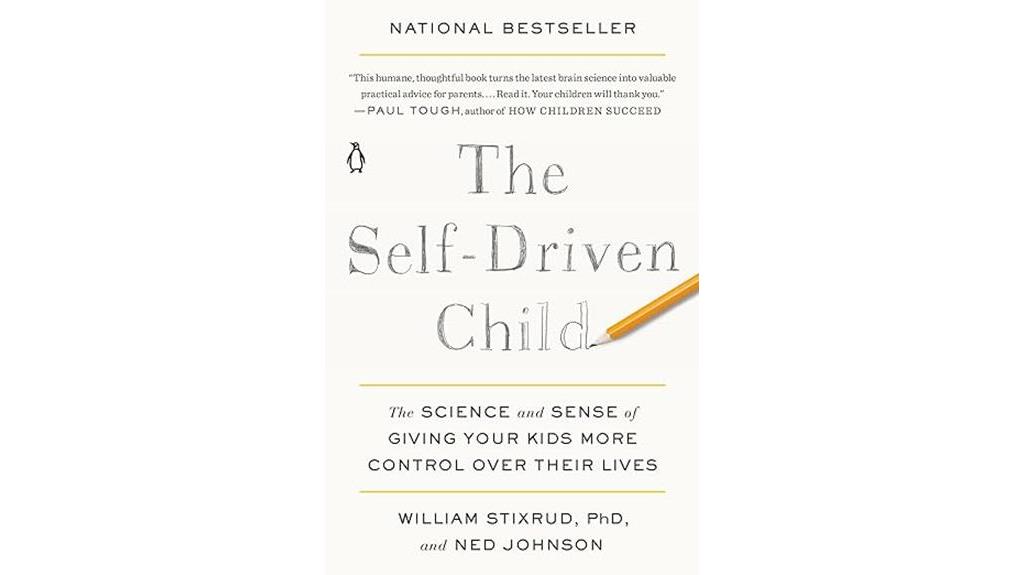
Parents seeking to empower their children and promote autonomy will find 'Parenting Books for a Happier Family' an invaluable resource for fostering resilience and internal motivation in their kids. In 'The Self-Driven Child: The Science and Sense of Giving Your Kids More Control Over Their Lives', authors William Stixrud and Ned Johnson emphasize the importance of creating a sense of control in children's lives to prepare them for the challenges they'll face.
The book advocates for a shift from a controlling to a consulting role as a parent, encouraging children to take more control over their decisions. By focusing on stress management and autonomy, parents can help their children develop resilience and internal motivation. Practical advice includes allowing children space to make decisions, promoting autonomy, competence, and relatedness, and offering empowering mental strategies for motivation and success.
The book's impact is evident in improved parent-child relationships and empowered children making confident decisions.
Best For: Parents, coaches, and teachers seeking to empower children to take control over their lives and improve resilience and internal motivation.
Pros:
- Encourages a shift from controlling to consulting parenting approach.
- Provides practical advice on stress management and autonomy.
- Offers empowering strategies for children's motivation and success.
Cons:
- Some parents may struggle to transition from a controlling to a consulting role.
- Requires consistent effort and patience to implement the book's principles effectively.
- May not fully address specific individual challenges faced by every child.
Teen Girls Survival Guide: Make Friends, Build Confidence, Avoid Peer Pressure, Overcome Challenges, Prepare for Future

A must-have guide for helping teen girls navigate friendships, boost confidence, resist peer pressure, overcome challenges, and prepare for the future is the Teen Girls Survival Guide. This book has received positive feedback from both teenage girls and parents.
Teenagers have found it helpful in improving their communication skills and becoming more comfortable discussing important topics. Parents appreciate the book's direct approach and its ability to engage even reluctant readers.
The guide covers a wide range of subjects relevant to teenage girls, such as self-care in social settings and the importance of seeking help from trusted adults when needed.
With recommendations and positive reviews highlighting its effectiveness, the Teen Girls Survival Guide proves to be a valuable resource for young girls entering their teen years.
Best For: Parents looking for a comprehensive guide to help their teenage girls navigate friendships, boost confidence, resist peer pressure, overcome challenges, and prepare for the future.
Pros:
- Provides practical advice on communication and self-care for teenage girls.
- Engages both teenage girls and parents with its direct and informative approach.
- Covers a wide range of relevant topics for young girls transitioning into their teen years.
Cons:
- May not appeal to teenage girls who are resistant to self-help or guidance books.
- Some readers may find certain sections too mature or advanced for younger teenagers.
- Parents may need to encourage reluctant readers to engage with the content.
The Daily Dad: 366 Meditations on Parenting, Love, and Raising Great Kids
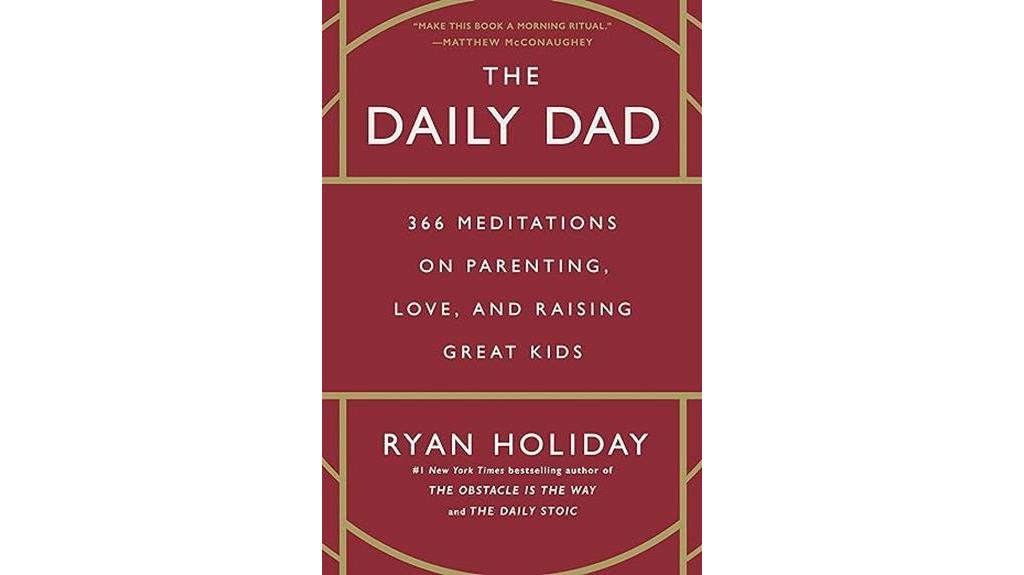
Ideal for dads seeking daily inspiration and practical parenting advice, 'The Daily Dad: 366 Meditations on Parenting, Love, and Raising Great Kids' offers valuable insights for managing fatherhood. With 366 concise meditations, this book provides bite-sized reflections perfect for busy dads like me. Drawing from personal experiences, timeless wisdom, and modern parenting research, each meditation touches on various aspects of fatherhood, fostering a sense of community and connection among fathers.
Readers recommend this book for its daily mindful moments, highlighting its impact on new parents and its resonance with readers. Key insights stress the importance of being present with children and prioritizing their needs. 'The Daily Dad' serves as a guide for parents and educators, enhancing parenting skills to create a positive impact on children's lives.
Best For: Busy dads seeking daily inspiration and practical parenting advice.
Pros:
- Offers daily mindful moments for fathers, moms, or caregivers.
- Provides valuable insights on parenting, love, and raising great kids.
- Fosters a sense of community and connection among fathers.
Cons:
- Some aspects may come across as intense or political to certain readers.
- Criticisms regarding comparisons to other works by the author.
- Feedback on missing features like a built-in bookmark.
1-2-3 Magic: Gentle 3-Step Child & Toddler Discipline for Calm, Effective, and Happy Parenting
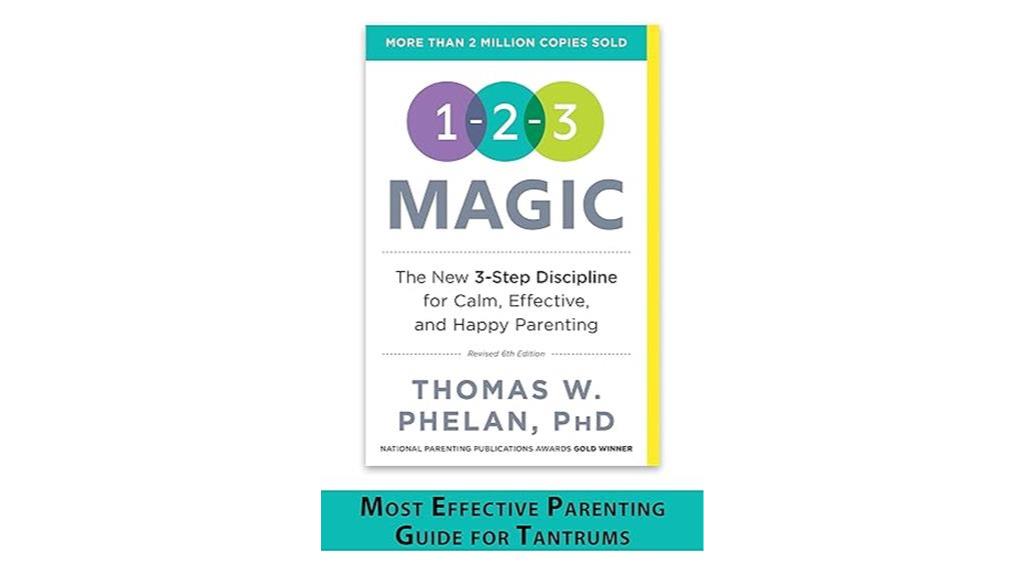
For those seeking a gentle and effective approach to child and toddler discipline, the 'Parenting Books for a Happier Family' offers the 1-2-3 Magic method as a calming and practical solution. This method introduces a 3-step process that emphasizes setting clear boundaries and using consequences to manage behavior.
Rather than engaging in lengthy discussions or escalating conflicts, parents can calmly implement the 1-2-3 Magic technique by giving a warning, counting to three, and applying a consequence if necessary. By focusing on consistency, simplicity, and maintaining composure, parents can create a more harmonious environment for their children.
The book provides specific guidance on using 'if/then' statements, ensuring that children understand the expectations and consequences of their actions. This method has received positive feedback from parents who've seen improvements in their children's behavior and a happier family dynamic.
Best For: Parents seeking a gentle and effective discipline approach for managing child and toddler behavior in a calm and practical manner.
Pros:
- Employs a simple 3-step process for setting boundaries and managing behavior.
- Emphasizes consistency and composure in parenting interactions.
- Offers specific techniques like 'if/then' statements for clearer communication with children.
Cons:
- May not be as effective for all children or in every situation.
- Requires parents to maintain consistency and patience in implementing the method.
- Some parents may find it challenging to adapt the technique to their child's individual needs.
Factors to Consider When Choosing Self Help Parenting Books

When selecting self-help parenting books, it's crucial to take into account factors such as the selection criteria, relevance to your parenting style, and practicality in application.
The impact these books may have on your parenting journey and learning from other readers' experiences can also play a significant role in making the right choice.
Selection Criteria
Consider the author's credentials and expertise in child psychology or parenting when selecting self-help parenting books for practical and effective guidance. It's important to confirm that the author has a solid background in the field to provide you with reliable advice.
Look for books that offer tangible strategies and techniques that you can easily apply in your day-to-day parenting challenges. Checking reviews and recommendations from other parents can give you insights into the book's effectiveness and relevance to your parenting style.
Assess the book's approach and philosophy to see if it resonates with your values and beliefs about parenting. Opt for books that specifically address the parenting issues you're currently facing, whether it's discipline, communication, or child development.
Additionally, seek recommendations from trusted sources such as parenting experts or therapists to guide your book selection process. By considering these criteria, you can choose self-help parenting books that best suit your needs and help you foster a happier family environment.
Relevance to Parenting
Examining whether the parenting book addresses specific challenges or concerns and aligns with one's parenting style and values is essential when selecting self-help parenting books. It's important to consider if the book tackles issues like communication struggles, effective discipline methods, or understanding child development stages that resonate with your parenting journey.
Additionally, choosing a book that reflects your parenting approach, whether it's gentle parenting, authoritative parenting, or a more structured method, can greatly impact its relevance to your family dynamics. Moreover, practical advice and actionable strategies that are easy to incorporate into your daily interactions with your children should be a key factor in your decision-making process.
Evaluating the author's credentials, expertise in parenting or psychology, and any professional endorsements can help gauge the book's credibility. Also, determining how the book caters to your child's age or developmental stage is important as strategies for parenting toddlers differ from those for adolescents.
Practicality and Application
When selecting a self-help parenting book that's practical and applicable, focus on seeking out strategies and techniques that can be easily implemented in real-life parenting scenarios.
Look for books that provide clear, step-by-step guidance on how to effectively apply the parenting techniques discussed.
Prioritize choosing a book that offers actionable advice with real-life examples to help you grasp how to incorporate these concepts into your daily interactions with your children.
Opt for books that include exercises or activities to practice the parenting skills introduced.
Consider the practicality of the strategies presented in the book and assess how seamlessly they can be integrated into your everyday life.
Evaluate whether the book offers customizable approaches that align with your family's unique needs and parenting style.
Check reviews or testimonials from other parents to gauge the effectiveness and practicality of the techniques provided in the book in real-world parenting situations.
Impact on Parenting
Parenting books play an essential role in shaping parenting styles and enhancing child-rearing practices by providing practical strategies and valuable insights. These books offer guidance on handling challenging situations, improving communication, and implementing effective discipline methods. By focusing on building strong parent-child relationships, fostering emotional intelligence, and promoting positive behavior in children, parenting books empower parents to address challenges confidently and create a nurturing home environment.
The impact of self-help parenting books extends beyond immediate solutions, encouraging personal growth, self-awareness, and the development of effective parenting techniques. They influence parenting styles by guiding boundaries, consequences, and communication with children, promoting consistency and a positive environment.
Reader Experiences
Reader experiences can serve as a valuable guide when exploring the vast landscape of self-help parenting books. By delving into personal testimonials and recommendations, one can gain profound insights into the practicality and impact of various parenting strategies. Understanding how readers have applied the advice from these books can offer a roadmap for others seeking resources that align with their parenting style. Feedback on specific techniques, advice, and overall effectiveness can help in determining if a book resonates with one's individual needs.
Real-world application stories shared by readers can provide a nuanced perspective on the transformative power of self-help parenting books in communication, boundary setting, and nurturing positive relationships with children. The anecdotes and insights shared by fellow readers often highlight the sense of community and support these books can offer in the rollercoaster journey of parenthood.
Author's Approach
When selecting self-help parenting books, it's important to consider the author's approach to parenting, including their focus on discipline, communication, emotional intelligence, or a combination of these aspects. Authors who provide practical strategies aligned with your parenting style and values can be particularly beneficial.
It's crucial to evaluate if the author's approach is evidence-based, drawing on research and psychology to support their recommendations. Additionally, take into account if the author's writing style is relatable, engaging, and easy to understand for practical application in real-life parenting situations.
Determining whether the author's approach addresses your specific parenting challenges and offers relevant solutions is key. Look for authors whose philosophy resonates with your own, as this alignment can enhance the book's impact.
Moreover, considering the author's qualifications, experience, credibility through reviews, and the provision of practical strategies and real-life examples are all important aspects to keep in mind when choosing a self-help parenting book.
Diversity in Perspectives
Exploring the diverse perspectives presented in self-help parenting books can offer valuable insights and alternative solutions to enhance one's approach to raising children. When selecting a parenting book, considering the range of viewpoints can provide a well-rounded understanding of different parenting styles and approaches.
Look for books that reflect various cultural, social, and familial backgrounds, offering a diverse set of experiences and insights. By prioritizing books that embrace inclusivity, parents can gain a broader understanding of effective parenting techniques. These diverse perspectives enrich the parenting journey by presenting fresh insights and alternative solutions to common issues.
Evaluating how authors address cultural differences, family dynamics, and individual needs ensures that the advice is applicable and inclusive. Seek out books that incorporate input from experts in child psychology and education, as well as real-life stories and practical tips from a variety of parents. Choosing a book that aligns with your parenting style and beliefs can provide a more thorough and enriching reading experience.
Frequently Asked Questions
How Can I Handle Sibling Rivalry Effectively in My Family?
When handling sibling rivalry in my family, I address conflicts promptly and calmly, acknowledging each child's feelings. Encouraging open communication helps them express emotions.
Implementing fair rules and consequences fosters a sense of equity and reduces tension. By fostering individual relationships with each child, I create a supportive environment that promotes understanding and empathy.
Consistent positive reinforcement and conflict resolution skills aid in managing and minimizing sibling rivalry effectively.
Are There Tips for Incorporating Mindfulness Into Daily Parenting Routines?
Incorporating mindfulness into daily parenting routines can enhance connection and reduce stress. Start with simple practices like deep breathing or mindful listening during interactions with your children.
Set aside dedicated time each day for mindfulness exercises, such as meditation or mindful walks. Consistency is key; aim for small, regular moments of mindfulness rather than sporadic efforts.
Over time, this can foster a calmer, more present parenting approach that benefits both you and your family.
What Are the Key Factors to Consider When Choosing Parenting Books?
When selecting parenting books, it's essential to take into account the author's expertise, the book's approach to parenting styles, and the specific challenges you're facing.
Look for practical advice that resonates with your values and beliefs. Remember, not all books will be a perfect fit; find one that speaks to you like a trusted friend giving advice.
Don't judge a book by its cover; explore the content to see if it aligns with your parenting goals and philosophies.
How Can I Navigate Co-Parenting Challenges After a Divorce?
Managing co-parenting challenges after a divorce requires open communication, setting boundaries, and prioritizing the well-being of the children. Establishing a detailed co-parenting plan can help handle expectations and reduce conflicts.
Flexibility and compromise are essential, as situations may evolve over time. Seeking support from a therapist or mediator can facilitate constructive discussions and problem-solving.
Is There Advice on Building Confidence and Resilience in Teen Girls?
Absolutely, building confidence and resilience in teen girls is essential. Encouraging open communication, fostering a supportive environment, and providing opportunities for personal growth can greatly enhance their self-esteem.
Empowering them to make decisions, learn from failures, and celebrate successes can boost their resilience. Engaging in activities that promote self-discovery and self-expression can also contribute to their overall confidence and emotional strength.
It's important to show them love, understanding, and encouragement throughout this journey.
Are Self-Help Parenting Books also Effective for Developing Emotional Intelligence in Children?
Many experts believe that the best parenting books emotional intelligence can be effective for developing emotional intelligence in children. These books provide valuable insights and strategies for parents to help their children understand and regulate their emotions, ultimately leading to healthier and more empathetic individuals.
Conclusion
To sum up, these self-help parenting books offer valuable insights and practical tips for creating a happier, more harmonious family life. By implementing the strategies outlined in these books, parents can improve their relationships with their children, develop effective discipline techniques, and cultivate a deeper understanding of themselves as parents.
Investing time in reading and applying the knowledge from these books can lead to a more peaceful and fulfilling parenting journey. So, why not give them a try and see the positive impact on your family dynamics?
Vetted
15 Best Natural Parenting Books Every Parent Should Read
Yearning for insightful guidance on natural parenting? Discover the top 15 books every parent should read for holistic approaches and valuable tips.

Navigating natural parenting involves discovering the **best books** on pregnancy, childbirth, and parenting styles. **’The Mama Natural Week-by-Week Guide’** gives amazing advice. **’Raising Good Humans’** offers mindful parenting tips. **’Natural Hospital Birth’** mixes natural and hospital births wonderfully. **’Your Child’s Best Face’** shares solid child health tips. **’The Nourishing Traditions Book’** explores traditional nutrition. **’Smart Medicine for a Healthier Child’** presents holistic remedies. **’Thriving with ADHD’** aids in natural ADHD management. Dive into these top natural parenting books and enjoy the journey!
Key Takeaways
- Practical tips for pregnancy, labor, and postpartum.
- Insightful strategies for handling parenting challenges.
- Empowerment for unmedicated hospital births.
- Solutions for child health and wellness.
- Traditional nutrition wisdom for holistic child-rearing.
The Mama Natural Week-by-Week Guide to Pregnancy and Childbirth

For those seeking a thorough and natural approach to pregnancy and childbirth, 'The Mama Natural Week-by-Week Guide' is an invaluable resource.
This detailed book breaks down essential information into easily digestible sections, covering everything from appointments and tests to exercises and healthy practices during pregnancy.
I appreciate the science-based research woven throughout the book, along with its beautiful illustrations that enhance understanding.
The week-by-week guide offers a unique perspective on pregnancy from a natural angle, making it a standout choice for expectant mothers.
Readers have shared positive experiences with the book, highlighting its practical tips, illustrations, and guidance on various aspects of pregnancy, labor, postpartum, and even pregnancy loss.
Whether you're a first-time mom or already experienced, this book emphasizes the importance of informed decision-making throughout your pregnancy journey.
Best For: Expectant mothers seeking a comprehensive and natural approach to pregnancy and childbirth.
Pros:
- Provides easily digestible information on various pregnancy-related topics.
- Offers practical tips, beautiful illustrations, and guidance for pregnancy, labor, and postpartum.
- Emphasizes informed decision-making and encourages a natural perspective on pregnancy.
Cons:
- Some readers have reported issues with printing errors and damaged copies.
- Minor concerns about the cost and appearance of the book.
- Quality feedback varies among readers.
Raising Good Humans: A Mindful Guide to Breaking the Cycle of Reactive Parenting
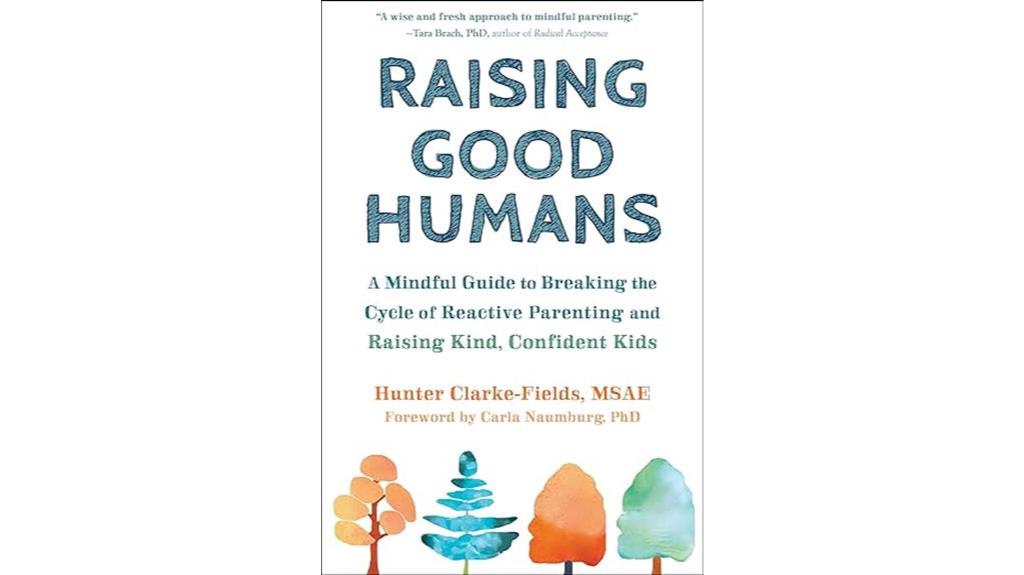
This insightful guide on breaking the cycle of reactive parenting is a valuable resource for parents seeking to enhance their approach to raising children mindfully. With positive reviews highlighting its helpfulness and engaging delivery, 'Raising Good Humans' has resonated with many readers, especially first-time parents.
The book's impact on parenting is evident, with readers mentioning a shift in their parenting style and the ability to navigate challenging moments with their children more effectively. While some readers faced challenges in unlearning past habits, the emphasis on self-work and mindfulness practices proved beneficial in their parenting journey.
Personal experiences shared by readers showcase the book's effectiveness in identifying triggers, promoting self-reflection, and ultimately, helping individuals become better parents. By emphasizing specific techniques like I language and mindfulness practices, this book equips parents with the tools to raise confident and emotionally resilient children.
Best For: Parents looking to break the cycle of reactive parenting and adopt a mindful approach to raising confident and resilient children.
Pros:
- Insightful and engaging delivery that resonates with readers.
- Effective strategies for handling difficult parenting moments.
- Emphasis on self-work and mindfulness practices for personal growth as a parent.
Cons:
- Some readers may find it challenging to unlearn past parenting habits.
- Initial difficulty in approaching mindfulness practices for a few readers.
- The emphasis on self-reflection and personal growth may require significant effort and commitment.
Natural Hospital Birth 2nd Edition: The Best of Both Worlds

With its practical guidance and real-life accounts, 'Natural Hospital Birth 2nd Edition: The Best of Both Worlds' is an invaluable resource for expectant mothers seeking to prepare for unmedicated hospital births.
The book not only offers information on natural birthing techniques but also provides insights into maneuvering the hospital environment while aiming for a medication-free delivery.
Readers appreciate the unbiased approach taken by the author, which allows all birthing mothers to benefit from the book's content, regardless of their birth plan.
By sharing personal experiences and testimonials, the book instills confidence in women, empowering them to advocate for their preferences during childbirth.
'Natural Hospital Birth 2nd Edition' stands out for its practical advice, helping mothers create birth plans aligned with their desires and make informed decisions throughout the labor process.
Best For: Expectant mothers seeking to prepare for unmedicated hospital births and looking for unbiased, practical guidance.
Pros:
- Valuable information for preparing for unmedicated hospital births
- Real-life accounts and personal experiences shared
- Empowers women to make informed decisions and advocate for their preferences during childbirth
Cons:
- May not cater to those planning medicated births
- Limited focus on alternative birthing options outside of hospitals
- Some readers may find the content repetitive if already well-versed in natural birthing techniques
Your Childs Best Face: How To Nurture Top Health & Natural Glow

Exploring your child's top health and natural glow is made accessible through the insightful guidance provided in 'Your Child's Best Face,' a must-read for parents seeking to prioritize their child's overall well-being.
This book investigates the facial signs that can indicate underlying dental and systemic issues in children. It stresses the importance of early interventions to improve health outcomes.
In today's modern lifestyle, factors like diet and breathing habits can impact a child's facial development and overall health. 'Your Child's Best Face' offers practical solutions to reverse issues like mouth breathing and cavities, highlighting the link between facial symmetry and gut health.
With clear visuals and real-life cases, this book equips parents and dentists with the knowledge needed to address early signs of dental problems and promote their child's well-being.
Best For: Parents and dentists who want to understand the early signs of dental and systemic issues in children and learn how to improve their overall health outcomes.
Pros:
- Offers practical solutions to reverse issues like mouth breathing and cavities in children.
- Provides clear visuals and real-life cases to enhance understanding of facial development and health.
- Emphasizes the importance of early interventions for better physical and mental well-being in children.
Cons:
- Might require further professional consultation for specific individual cases.
- Some readers may find the technical dental terminology challenging to grasp.
- Not a quick-fix solution and requires consistent effort and follow-through.
The Nourishing Traditions Book of Baby & Child Care

For parents seeking a holistic approach to child-rearing rooted in traditional nutritional wisdom, 'The Nourishing Traditions Book of Baby & Child Care' offers an all-encompassing guide. This book explores the benefits of a traditional diet rich in grass-fed animal fats and proteins, contrasting it with conventional beliefs.
Drawing inspiration from Dr. Weston Price's research on traditional diets, it critiques mainstream dietary advice for babies and emphasizes the importance of animal fats in promoting healthy childbearing.
From pregnancy and nutrition guidelines to childbirth and newborn care advice, this book covers a wide array of topics. It also provides insights on infant care, feeding, child development, and nutrition, advocating for real foods and offering practical tips on parenting and toxin avoidance.
If you're looking to nurture your child's health through traditional nutritional practices, this book is a valuable resource.
Best For: Parents seeking a holistic and traditional approach to child-rearing through nutrition-focused practices.
Pros:
- Comprehensive coverage of traditional nutritional wisdom for raising healthy children.
- Emphasis on the importance of real foods and nutrients over conventional dietary advice.
- Practical tips and insights on pregnancy, childbirth, infant care, and child development.
Cons:
- May not align with mainstream dietary guidelines, potentially causing conflicting viewpoints.
- Emphasizes animal fats and proteins, which may not suit all dietary preferences.
- Some recommendations, such as homemade baby formulas, may require extra effort and preparation.
Mindful Birthing: Training the Mind, Body, and Heart for Childbirth and Beyond
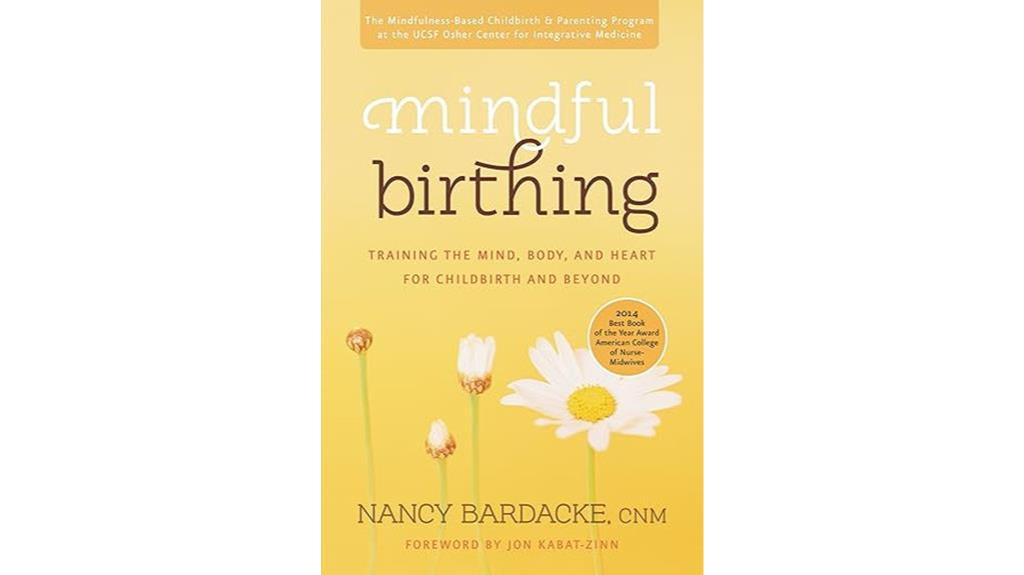
Readers seeking a thorough guide to incorporating mindfulness practices into their childbirth experience and beyond will find 'Mindful Birthing' a valuable resource.
This book has been praised for its ability to ease worries about childbirth and provide practical tools for labor and delivery. Many readers appreciated the holistic approach that 'Mindful Birthing' offers, finding the mindfulness techniques helpful in staying calm and in control during the birth process.
The non-judgmental stance of the book has also been well-received by individuals with different birth experiences. Highly recommended for expecting mothers and their partners, 'Mindful Birthing' has been found beneficial for various types of births, including medication-free births and VBACs.
Additionally, the book includes postpartum mindfulness techniques to help parents stay present and manage stress during the challenging early months of parenthood.
Best For: Expecting mothers and their partners seeking a mindful approach to childbirth and wanting practical tools for labor and delivery.
Pros:
- Provides practical tools for labor and delivery.
- Offers mindfulness techniques to stay calm and in control during childbirth.
- Includes postpartum mindfulness techniques for managing stress in the early months of parenthood.
Cons:
- May not resonate with individuals who prefer traditional childbirth approaches.
- Some readers may find the mindfulness techniques challenging to incorporate into their routine.
- The book's non-judgmental approach may not appeal to those seeking more prescriptive guidance.
The Natural Baby Sleep Solution

In addition to the practical approach offered by 'Natural Parenting Books for Parents' in improving infant sleep patterns through 'The Natural Baby Sleep Solution', this book has garnered positive testimonials. Parents have reported significant improvements in their baby's sleep routines, with some highlighting how the book helped a 10-month-old achieve uninterrupted sleep and reduced night awakenings.
The program's effectiveness was noticeable within just a few days of implementation, indicating quick results for sleep-deprived parents. Additionally, the book provides evidence-based information and valuable insights into recognizing signs of tiredness in babies, aiding in establishing better sleep habits.
While some feedback suggests a lack of tips for older infants, overall, the book's realistic expectations and user-friendly approach make it a valuable resource for parents seeking to enhance their baby's sleep quality.
Best For: Parents seeking evidence-based and practical guidance to improve their baby's sleep patterns efficiently.
Pros:
- Evidence-based information and clear insights for recognizing baby's tiredness cues.
- Quick results observed within a few days of implementing the program.
- Positive testimonials and recommendations from parents highlighting improved sleep quality.
Cons:
- Lack of practical tips specifically tailored for older babies.
- Realistic expectations may not fully address all sleep issues for every infant.
- Could benefit from more comprehensive guidance on sleep training techniques.
Nurture: A Modern Guide to Pregnancy, Birth, Early Motherhood
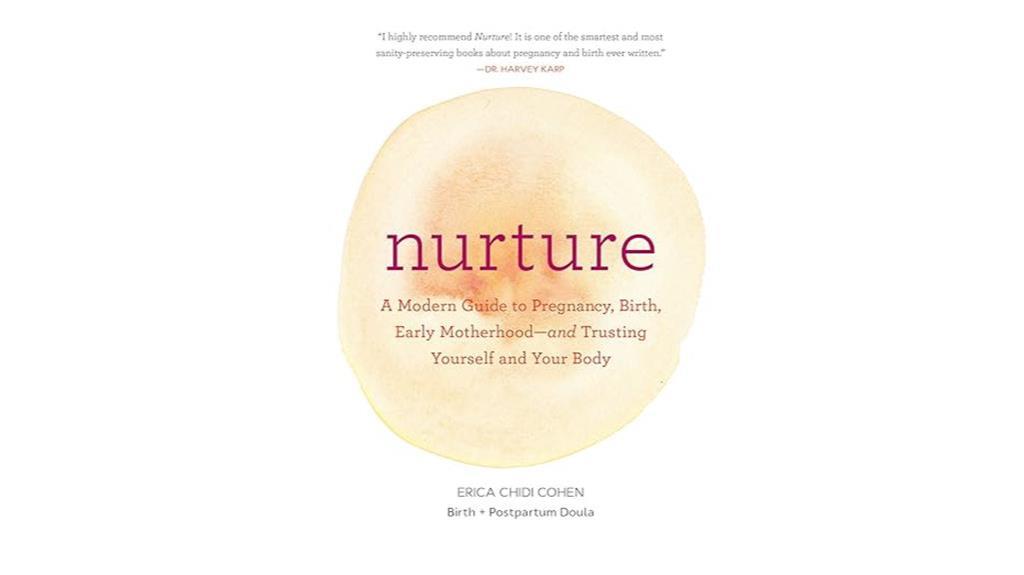
With its focus on holistic and natural birthing practices, 'Nurture: A Modern Guide to Pregnancy, Birth, Early Motherhood' is a valuable resource for expectant mothers seeking empowering and detailed information. The book encompasses various aspects of pregnancy, labor, birth, and postpartum care, offering thorough content ranging from baby development and body changes to breastfeeding and birth plans.
It provides practical advice on holistic birthing practices and includes month-by-month chapters addressing nutrition, exercises, and mental well-being. 'Nurture' also adds a personal touch by guiding readers through the emotional journey of pregnancy, encouraging trust in instincts, and offering relaxation techniques.
Despite some criticisms of basic or outdated information, the book remains educational, informative, and supportive, making it a beneficial read for expecting mothers looking for a blend of science and emotional support.
Best For: Expectant mothers who value holistic and natural birthing practices and seek a comprehensive guide for pregnancy, labor, and early motherhood.
Pros:
- Comprehensive coverage from pregnancy to postpartum, including baby development and birth plans.
- Personalized emotional support and encouragement for trusting instincts.
- Practical advice on holistic birthing practices and month-by-month guidance for well-being.
Cons:
- Some may find the information basic or outdated.
- Not universally applicable due to cultural differences.
- Mixed reviews on the scientific accuracy of the content.
Ina Mays Guide to Childbirth Updated With New Material
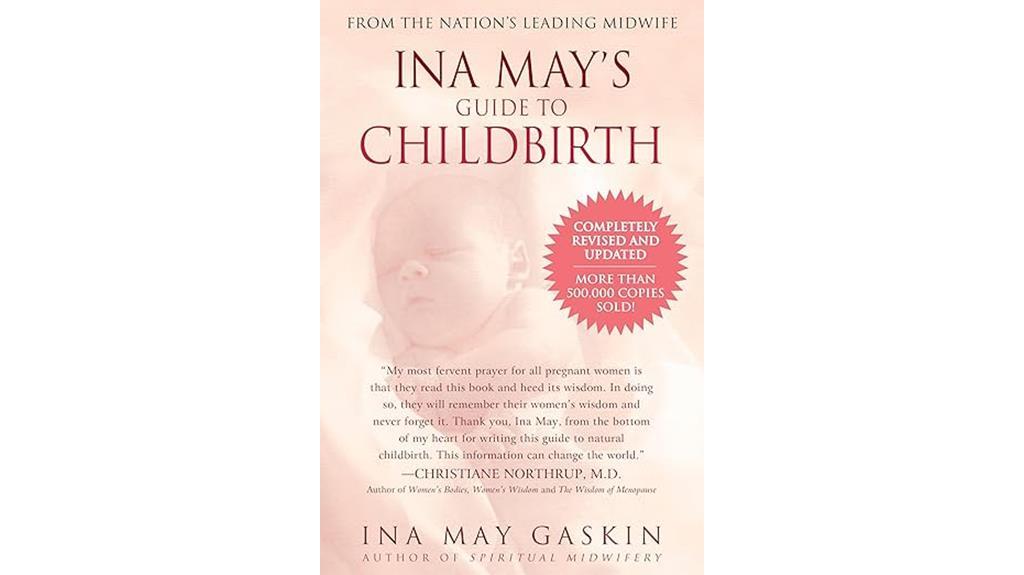
For parents seeking thorough guidance on natural childbirth experiences and empowerment, 'Ina May's Guide to Childbirth' with updated material is an invaluable resource. Ina May Gaskin, a renowned midwife, provides a wealth of knowledge and inspiration in this book.
The updated version includes new material that further enhances its relevance for expecting parents. Through empowering birth stories and practical advice, the book equips readers with confidence and understanding about the childbirth process.
It emphasizes the importance of informed decision-making and advocates for the natural birthing experience while also acknowledging the potential for medical interventions. Whether you're a first-time parent or looking to enhance your childbirth knowledge, 'Ina May's Guide to Childbirth' offers a detailed and insightful perspective that can positively impact your journey into parenthood.
Best For: Expecting parents seeking empowering birth stories, practical advice, and a deeper understanding of natural childbirth.
Pros:
- Provides empowering birth stories and practical advice.
- Equips readers with confidence and understanding about the childbirth process.
- Advocates for informed decision-making and natural birthing experiences.
Cons:
- May not fully address the complexity of medical interventions during childbirth.
- Some readers may find the emphasis on natural birth limiting in certain situations.
- Personal experiences shared may not resonate with all readers.
Breastfeeding Made Simple: Seven Natural Laws for Nursing Mothers
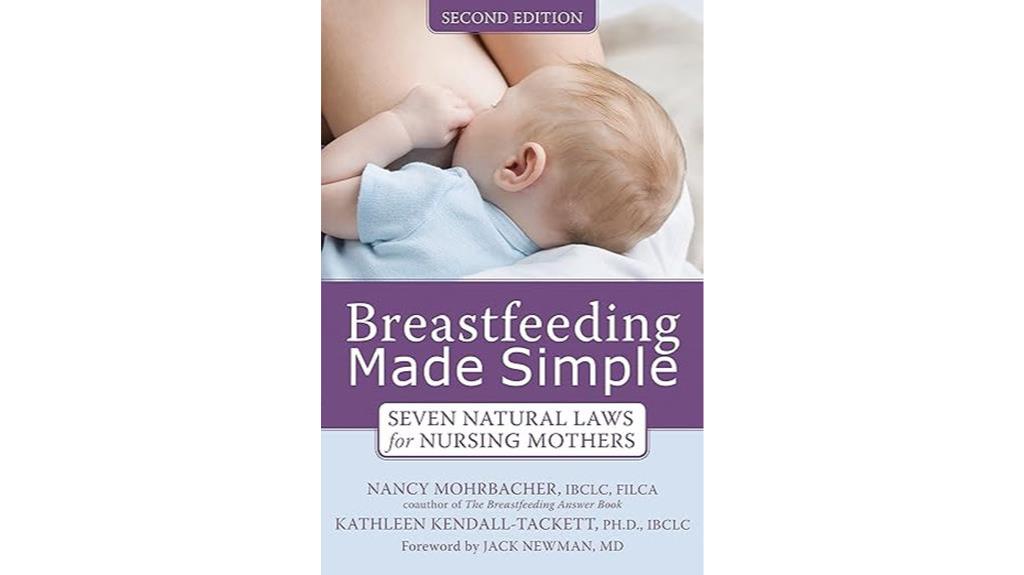
The book 'Breastfeeding Made Simple: Seven Natural Laws for Nursing Mothers' serves as an invaluable resource for first-time breastfeeding mothers looking for practical guidance and support. It offers a thorough guide to help mothers navigate the challenges and joys of breastfeeding.
Through personal experiences shared by other mothers, the book provides reassurance and practical tips on overcoming common breastfeeding obstacles. Reading this book before giving birth can better prepare mothers for the breastfeeding journey ahead.
It emphasizes the benefits of breastfeeding, both considering cost savings and the health advantages it offers to the baby. With explanations on milk supply, latch techniques, and addressing breastfeeding issues, this book equips mothers with the knowledge needed for successful nursing.
Best For: First-time breastfeeding mothers seeking practical guidance and support for overcoming common breastfeeding challenges and achieving successful nursing.
Pros:
- Comprehensive guide offering practical tips and insights from real experiences of other mothers.
- Emphasis on the benefits of breastfeeding and cost savings associated with it.
- Structured content covering essential topics like milk supply, latch techniques, and addressing breastfeeding issues.
Cons:
- May not cater to experienced breastfeeding mothers looking for more advanced techniques or information.
- Some readers may find the content repetitive if they have already gathered similar information from other sources.
- Limited focus on specific medical conditions or complications that may arise during breastfeeding.
The Best Homemade Baby Food on the Planet
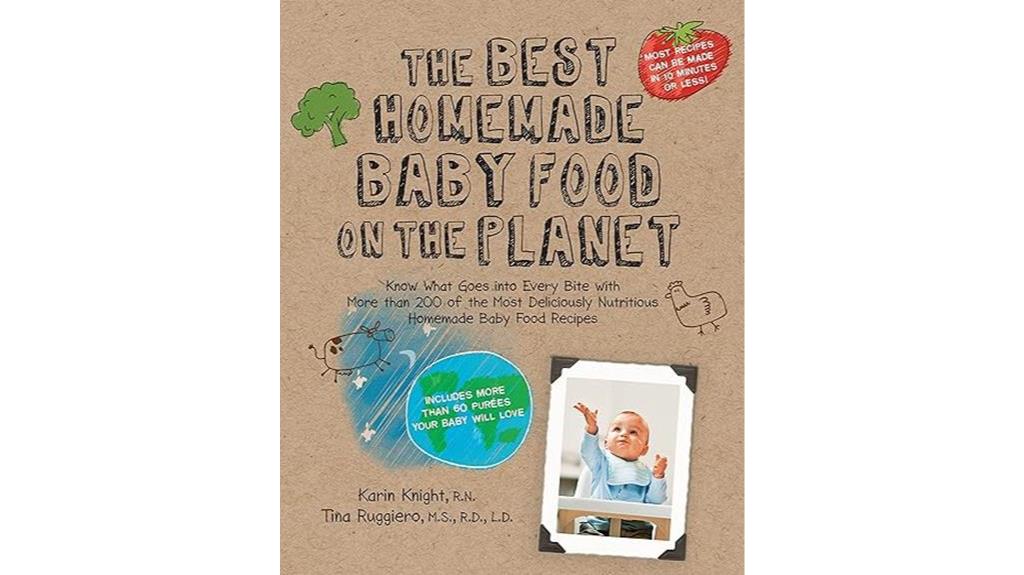
Containing a variety of creative and nutritious recipes, this book is a must-have for parents seeking to provide their babies and toddlers with wholesome homemade meals. With a clear layout and easy-to-follow instructions, it offers a range of healthy options that are quick to prepare, making mealtime a breeze for busy parents.
The incorporation of nutrient-dense foods and age-appropriate recipes guarantees that little ones receive the essential nutrition they need to thrive. Endorsed by a Registered Dietitian, this book emphasizes the significance of good nutrition for young children and provides valuable insights for parents guiding the world of homemade baby food.
From introducing foods based on age to freezer-friendly options and storage tips, this book equips parents with practical information to support their child's healthy eating journey.
Best For: Parents looking for a comprehensive guide to preparing creative and nutritious homemade meals for their babies and toddlers.
Pros:
- Well laid out with clear instructions.
- Variety of creative and healthy recipes.
- Includes practical information and tips for parents.
Cons:
- Some concerns raised about breastfeeding information.
- Desire for more diverse recipes beyond purees.
- Limited ideas catering to older babies.
Gentle Birth, Gentle Mothering: A Doctor's Guide to Natural Childbirth and Gentle Early Parenting Choices
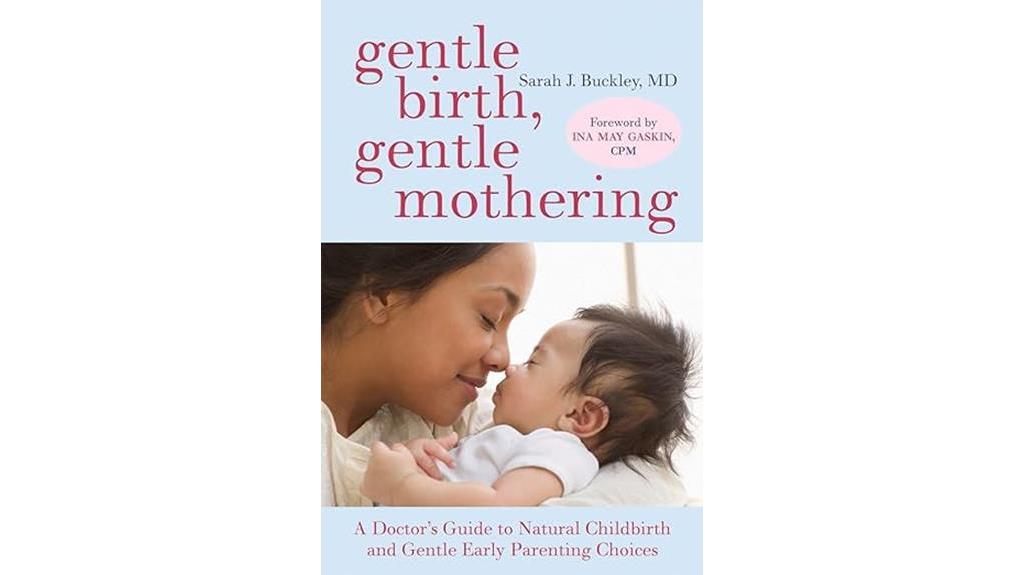
Highly recommended for those seeking evidence-based guidance on natural childbirth and early parenting choices, 'Gentle Birth, Gentle Mothering' empowers individuals to make informed decisions during their pregnancy journey.
Dr. Sarah Buckley's book advocates for undisturbed birth and gentle early parenting choices, presenting research against interventions like ultrasound and epidurals while emphasizing the benefits of skin-to-skin contact and breastfeeding.
The well-rounded mix of scientific facts and personal experiences encourages readers to explore birth options with an open mind. While some critics find the book too focused on natural birth, many appreciate the confidence it instills during labor.
Overall, 'Gentle Birth, Gentle Mothering' offers a thorough look at childbirth choices, helping readers navigate the journey with autonomy and informed decision-making.
Best For: Expectant mothers and individuals seeking evidence-based information and empowerment in natural childbirth and early parenting choices.
Pros:
- Research-based information advocating for undisturbed birth and gentle early parenting choices.
- Emphasis on benefits of skin-to-skin contact, co-sleeping, and breastfeeding supported by scientific evidence.
- Encourages informed decision-making in childbirth with a blend of personal experiences and research.
Cons:
- Some readers may find the book's emphasis on natural birth overwhelming or biased.
- Criticisms include a perceived negativity towards medical interventions rather than a balanced view.
- The book may trigger defensiveness or fear of medical interventions for some readers.
Smart Medicine for a Healthier Child

For parents seeking a thorough guide to childhood health remedies, 'Smart Medicine for a Healthier Child' is an invaluable resource. This book offers detailed information on a wide range of treatments for childhood maladies, providing parents with a thorough, effective, and helpful approach to managing their child's health.
It covers allopathic, herbal, homeopathic, and natural remedies in an easy-to-reference alphabetical layout. With a section dedicated to when to call the doctor, it offers valuable guidance in emergency situations. Users praise its extensive approach, practicality, and usefulness in addressing common and uncommon childhood illnesses.
Recommended by parents, birth assistants, and doulas, this book's versatility in providing nutritional, homeopathic, and herbal suggestions makes it a must-have for all parents looking to empower themselves in their child's health management.
Best For: Parents and caregivers looking for a comprehensive guide to managing their child's health through a variety of treatment options.
Pros:
- Provides detailed information on allopathic, herbal, homeopathic, and natural remedies.
- Alphabetical layout for easy reference.
- Includes guidance on when to seek medical help in emergency situations.
Cons:
- May be overwhelming for some users due to the extensive information provided.
- Could benefit from more specific dosage and administration guidelines.
- Limited focus on preventive measures for maintaining children's health.
Thriving with ADHD: A Guide to Naturally Reducing ADHD Symptoms in Your Child

The guide 'Thriving with ADHD: A Guide to Naturally Reducing ADHD Symptoms in Your Child' is a valuable resource for parents seeking holistic strategies to support their child's well-being. Parents who've used the book found it practical, easy to follow, and filled with actionable steps. It serves as an excellent starting point for implementing natural approaches to address ADHD symptoms in children.
The book's holistic perspective, including advice on dietary and lifestyle changes, has been well-received by testimonials. Professionals, like integrative medicine physicians, have praised the impactful solutions presented in the book, emphasizing the importance of finding lasting remedies for children with challenging behaviors.
Readers appreciate the alternative treatment options beyond medication, finding hope in the possibility of their children thriving through healthy and natural methods. The book offers gratitude and inspiration, making it a recommended read for parents looking to understand and address ADHD symptoms from a holistic viewpoint.
Best For: Parents seeking natural and holistic strategies to help their children manage ADHD symptoms effectively.
Pros:
- Practical, easy-to-understand guide with actionable steps.
- Offers holistic approach including dietary and lifestyle recommendations.
- Provides hope and inspiration for parents looking for alternative treatments beyond medication.
Cons:
- May require significant time and effort to implement dietary and lifestyle changes.
- Individual results may vary in terms of symptom improvement.
- Some readers may prefer more in-depth scientific explanations on the strategies suggested.
The Simplest Pregnancy Book in the World
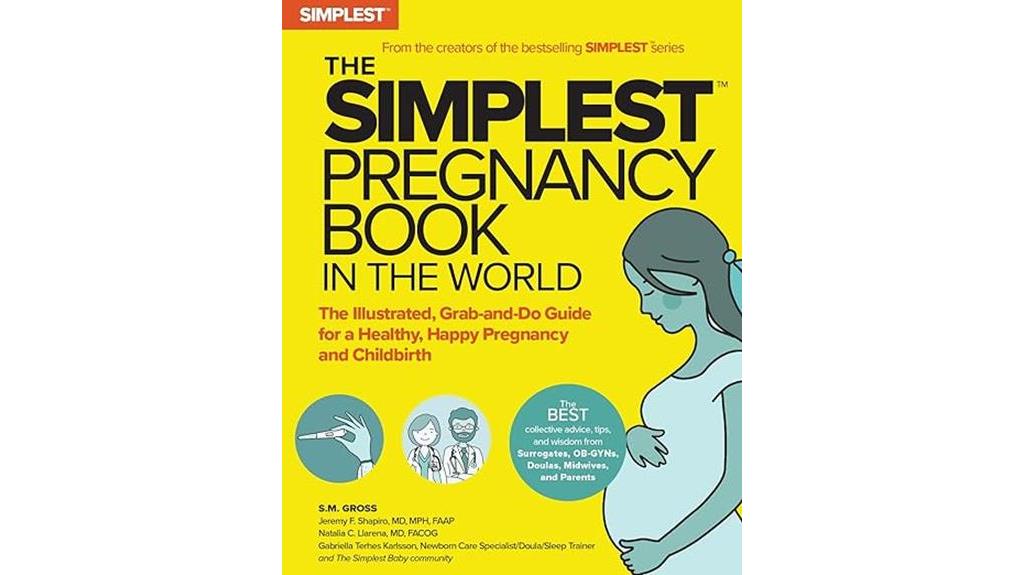
With its practical and informative approach, 'The Simplest Pregnancy Book in the World' is a must-have for expectant moms seeking a straightforward guide to pregnancy and childbirth. This book has garnered positive reviews for its ability to ease fears and provide answers to common questions expectant mothers may have.
It covers a wide range of topics related to pregnancy and childbirth, helping readers prepare for labor and find suitable resources. The information presented is detailed yet concise, making it easy to traverse and understand.
Whether you're a first-time mom or experienced in parenthood, this book offers honest facts, helpful hacks, and practical tips for each trimester and post-birth care. Written in a simple and accessible manner, 'The Simplest Pregnancy Book in the World' is organized for easy reading, making it a valuable resource for journeying through the experience of pregnancy and parenthood.
Best For: First-time and experienced moms looking for a practical and informative guide to pregnancy and childbirth.
Pros:
- Practical, simple, and informative approach.
- Eases fears and answers common questions for expectant moms.
- Useful information presented in a detailed yet concise manner.
Cons:
- May lack in-depth coverage on certain specific topics.
- Some readers may prefer more visual aids or illustrations.
- Limited focus on postpartum mental health and emotional well-being.
Factors to Consider When Choosing Natural Parenting Books

When selecting natural parenting books, it's crucial to take into account criteria such as the author's credibility, the relevance of the content to your parenting style, and the inclusion of practical tips.
Ensuring the book balances modern practices with natural approaches can provide a well-rounded perspective on parenting techniques.
Criteria for Selecting Books
Consideration of the author's credentials and expertise in natural parenting is essential when selecting books on the subject. Making sure that the author has a solid background in natural parenting practices can help guarantee that the information provided is reliable and trustworthy.
Look for books that not only offer practical tips but also present evidence-based research and actionable advice for implementing natural parenting methods effectively. It's beneficial to choose a book that covers a wide range of topics related to pregnancy, childbirth, breastfeeding, and child development to get a thorough understanding of natural parenting.
Additionally, prioritize books that align with your parenting philosophy and values to ensure that the content resonates with your approach. Selecting a book that provides guidance on incorporating natural remedies, holistic practices, and healthy lifestyle choices for raising children can further support your natural parenting journey.
Author Credibility Importance
To ensure the reliability and trustworthiness of information in natural parenting books, it's essential to carefully assess the credibility of the authors behind the content.
When selecting a natural parenting book, consider authors with backgrounds in fields like pediatrics, child psychology, nutrition, or holistic health. Authors who are experienced practitioners, researchers, or educators in natural parenting can offer valuable insights and evidence-based advice.
Look for authors with a strong reputation in the natural parenting community or those who've published well-regarded works in the field. Checking for endorsements, reviews, or recommendations from reputable sources or experts in natural parenting can help gauge the author's credibility.
Authors with relevant qualifications, experience, and expertise in natural parenting increase the credibility of the content they provide. Additionally, authors who've conducted research, published studies, or have a background in child development are more likely to offer valuable insights in their books.
Consider the author's reputation and track record in the natural parenting space to align their perspectives with your values and beliefs.
Relevance to Parenting Style
Understanding how a natural parenting book resonates with my personal parenting philosophy and values is vital when selecting reading material for guidance and insights. It's essential to assess whether the book aligns with my parenting style, whether it's attachment parenting, gentle parenting, or holistic parenting.
By choosing a book that mirrors my approach, I can better integrate the strategies and techniques suggested within its pages. Additionally, evaluating if the book addresses specific challenges I face in my parenting journey is paramount. It's important to make sure that the book's natural parenting approach is evidence-based and backed by research, providing a solid foundation for its recommendations.
Selecting a book that offers practical advice and strategies that can be easily implemented into my daily routines is advantageous. By focusing on my parenting style, concerns, and interests, I can find a natural parenting book that resonates with me and provides valuable insights tailored to my individual needs.
Inclusion of Practical Tips
How can natural parenting books enrich my journey as a parent by providing practical tips for implementing holistic parenting practices effectively and efficiently?
Natural parenting books offer valuable insights into incorporating holistic parenting methods into daily routines. When choosing a book, look for practical tips on breastfeeding, babywearing, natural remedies, and more. Seek step-by-step guidance on creating natural birth plans, making baby food, and practicing mindfulness techniques.
Opt for books with hands-on activities to help you apply these methods in real-life situations. It's beneficial to have real-life examples and case studies to understand how these practices work in different scenarios. Additionally, books should provide resources and references for further exploration. Practical advice supported by scientific evidence ensures safety and effectiveness.
Choose books with manageable tips that suit your busy lifestyle. By incorporating practical tips from natural parenting books, you can navigate the challenges of holistic parenting with confidence and ease.
Balancing Modern Practices
When selecting natural parenting books, it's important to examine how they strike a balance between modern medical practices and traditional or holistic approaches. Look for books that offer a well-rounded view of modern parenting challenges while advocating for natural solutions.
Consider how the books address the integration of modern technology and natural parenting methods. Evaluate if the books provide evidence-based information on the effectiveness of natural parenting techniques in a modern context. Assess whether the books offer practical tips and strategies for incorporating natural parenting principles into a modern lifestyle.
Also, consider how the book balances modern parenting practices with natural and holistic approaches. Look for information on integrating traditional wisdom with contemporary research and recommendations. Evaluate the book's approach to incorporating modern tools and technologies while staying true to natural parenting principles.
Check if the book addresses the challenges of navigating modern lifestyles while prioritizing natural and sustainable parenting choices. Make sure the book offers practical tips and strategies for implementing natural parenting in a modern world.
Research-Backed Information
To make informed choices when selecting natural parenting books, consider prioritizing those that present research-backed information supported by scientific studies and evidence. Look for books that cite reputable sources and studies to guarantee the information provided is reliable and accurate.
It's crucial to choose books that offer a balanced view of natural parenting methods, incorporating both traditional wisdom and modern research findings. Books that emphasize evidence-based practices and recommendations for raising children in a healthy and holistic manner can provide valuable insights.
Additionally, seek out books that emphasize the importance of informed decision-making based on scientific evidence when it comes to natural parenting choices. By selecting books that provide evidence-based information supported by scientific research on natural parenting practices, you can equip yourself with the knowledge needed to make informed decisions for your child's well-being.
Prioritizing research-backed information can help you navigate the vast array of natural parenting advice available and choose strategies based on proven research.
User-Friendly Layout
Consider selecting natural parenting books that feature a user-friendly layout, incorporating clear headings, bullet points, and diagrams to enhance comprehension and ease of navigation. A well-organized book can make it easier to find information quickly and follow the content effectively.
Look for books that break down complex concepts into manageable sections, offering a structured and organized reading experience. Check for clear headings and subheadings that guide you through the content seamlessly.
Opt for books with a consistent format, using bullet points, lists, and summaries to aid in understanding and retention of information. Additionally, a visually appealing layout with illustrations, charts, and diagrams can enhance your comprehension of challenging topics.
Make sure the book includes a table of contents, index, and glossary for easy access to specific topics and terms. By choosing a natural parenting book with a user-friendly layout, you can enhance your reading experience and benefit from a well-structured resource.
Engaging Visual Elements
Exploring natural parenting books involves seeking out those that incorporate engaging visual elements to enhance understanding and retention of information. Visual aids like illustrations, diagrams, and charts play an important role in simplifying complex concepts, making them more accessible and enjoyable to learn.
For instance, illustrations depicting parenting techniques or exercises can clarify instructions, aiding in easier implementation. Additionally, visual representations of data and statistics help readers grasp key points effectively, enabling them to make informed decisions. Books with visually appealing layouts and designs not only enhance the reading experience but also keep readers engaged throughout the content.
Colorful and well-designed graphics not only make the information more appealing but also aid in retention. By breaking up text-heavy sections and incorporating photographs and infographics, natural parenting books cater to various learning styles, ensuring active engagement with the content. Essentially, engaging visual elements are essential in making natural parenting books informative, interactive, and visually stimulating.
Frequently Asked Questions
Can Natural Parenting Books Help With ADHD Symptoms in Children?
Yes, natural parenting books can provide strategies and insights on supporting children with ADHD symptoms. These books often offer holistic approaches, such as nutrition, mindfulness, and positive discipline techniques, which can complement traditional treatment methods.
Understanding how lifestyle factors can impact ADHD symptoms may help parents better navigate their child's challenges. While not a replacement for professional medical advice, these resources can be valuable tools in managing ADHD in children.
How Can I Choose the Best Natural Parenting Book for My Family?
To choose the best natural parenting book for my family, I consider our specific needs and values. Researching authors and their expertise in natural parenting is essential. Reading reviews from other parents can provide valuable insights.
I also look for books that align with my parenting style and goals. Checking for up-to-date information and practical advice guarantees relevance.
Ultimately, selecting a book that resonates with me personally is key to finding the best fit for my family.
What Are Some Key Factors to Consider When Selecting a Natural Parenting Book?
When choosing a natural parenting book, consider the author's credentials, ensuring they have expertise in child development.
Look for a book that aligns with your parenting philosophy and addresses your specific concerns.
Check reviews for insights on readability and practicality.
Assess the book's organization and layout to see if it suits your learning style.
Lastly, opt for updated editions to access the latest research and recommendations.
These factors can guide you to the right natural parenting book for your family.
Do These Books Address Common Breastfeeding Challenges for New Mothers?
When it comes to addressing common breastfeeding challenges for new mothers, natural parenting books often provide valuable insights and practical tips.
These books typically cover topics such as latching issues, low milk supply, engorgement, and mastitis. They offer guidance on proper breastfeeding techniques, troubleshooting problems, and seeking professional support when needed.
Are There Specific Tips for Promoting Natural Sleep Solutions for Babies?
When it comes to promoting natural sleep solutions for babies, establishing a consistent bedtime routine can work wonders.
Incorporating soothing activities like gentle massages or lullabies can signal to your little one that it's time to wind down.
Additionally, creating a calm sleep environment with minimal distractions can help encourage peaceful slumber.
Are Natural Parenting Techniques Suitable for Raising Tweens?
Many parents find it challenging to navigate the tween years. Fortunately, there are numerous best parenting books for tweens that offer valuable insights into natural parenting techniques. By incorporating gentle discipline and open communication, parents can create a supportive and nurturing environment for their tweens to thrive.
Conclusion
As you explore the world of natural parenting, let these books be your guiding light, illuminating the path with wisdom and knowledge.
With each exploration of the page, you'll find yourself empowered to nurture your child with love and intention, creating a bond that will last a lifetime.
So immerse yourself in these insightful reads, and watch as your journey as a parent blossoms into something truly beautiful and fulfilling.
Vetted
15 Best Mindful Parenting Books Every Parent Should Read
Kickstart your mindful parenting journey with these 15 essential books, offering insights and strategies to navigate the challenges of raising children with mindfulness.

**Exploring** mindful parenting books really **boosts** your parenting journey. Must-reads include **”Raising Good Humans”**, which helps you ditch reactive habits, **”Mindful Birthing”**, offering a whole mind-body birth method, and **”Being at Your Best When Your Kids Are at Their Worst”**, packed with practical compassion tips. **”Parenting at Your Best”** shares amazing insights. When choosing from the many options, consider content and how engaging they are. These books give priceless strategies to grow a mindful parenting style.
Key Takeaways
- "Raising Good Humans" offers practical advice for mindful parenting.
- "Mindful Discipline" emphasizes emotional intelligence in parenting.
- "Mindful Birthing" focuses on training the mind, body, and heart.
- "Growing Up Mindful" provides insights on raising mindful children.
- "Parenting from the Inside Out" explores self-understanding in raising thriving kids.
Raising Good Humans: A Mindful Guide to Breaking the Cycle of Reactive Parenting
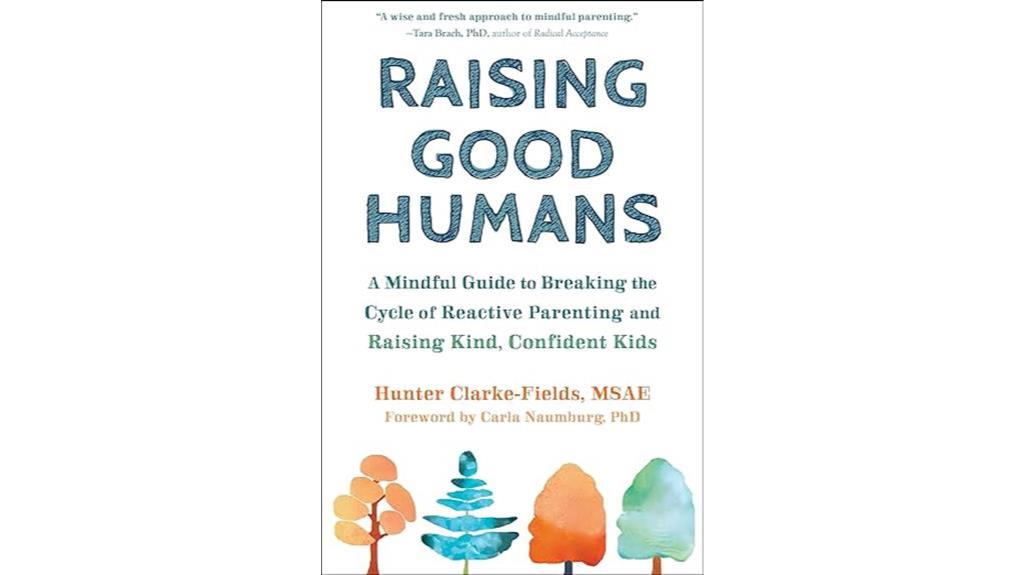
For those seeking insightful guidance on breaking the cycle of reactive parenting and fostering mindful relationships with their children, 'Raising Good Humans' is an invaluable resource. This book has received positive reviews and recommendations for its engaging and helpful approach, making it a must-read for all parents, especially first-timers.
Readers highlight the importance of self-work and patience in parenting, showing how this book can positively impact one's parenting style. Many readers mention how the strategies provided in 'Raising Good Humans' have helped them navigate challenging moments with their children, ultimately leading to more confident kids.
Despite some challenges in unlearning past parenting habits, the emphasis on self-work and mindfulness practices in this book has proven to be transformative for many.
Best For: Parents looking to break the cycle of reactive parenting and develop mindful relationships with their children.
Pros:
- Insightful guidance for improving parenting skills.
- Valuable strategies for handling difficult moments with children.
- Emphasis on self-work and mindfulness practices for personal growth.
Cons:
- Some readers may find it challenging to unlearn past parenting habits.
- Initial difficulty in approaching mindfulness practices for a few readers.
- Requires consistent effort and self-reflection, which may be demanding for some.
Mindful Parenting for ADHD Guide
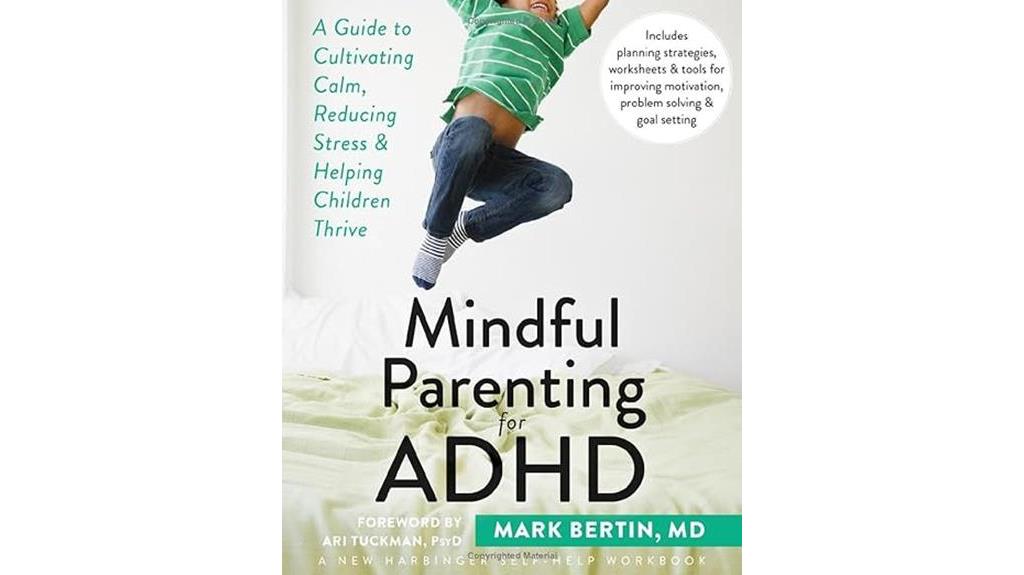
The 'Mindful Parenting for ADHD' guide is an invaluable resource recommended for parents managing the challenges of raising children with ADHD. This book offers a unique and practical approach, providing insightful advice alongside worksheets and action plans.
It covers essential topics such as organization techniques, homework plans, and academic support, emphasizing the importance of aiding children with ADHD in their learning journey. Medical professionals regard it as groundbreaking, contributing to a better understanding of ADHD as a developmental brain delay.
The book also focuses on practical guidance, offering easy-to-follow suggestions for effective parenting skills and communication strategies. By integrating mindfulness practices, it helps parents become more mindful individuals, fostering calm, improved focus, self-regulation, and compassion in handling the complexities of raising children with ADHD.
Best For: Parents of children with ADHD seeking practical guidance and support in mindful parenting techniques.
Pros:
- Comprehensive advice and worksheets for organization and academic support.
- Integration of mindfulness practices for improved focus and compassion.
- Easy-to-follow suggestions for effective parenting skills and communication strategies.
Cons:
- May require consistent practice and dedication to see significant results.
- Not all strategies may work for every child with ADHD.
- Additional support or resources may be needed for more complex cases.
Mindful Birthing: Training the Mind, Body, and Heart for Childbirth and Beyond
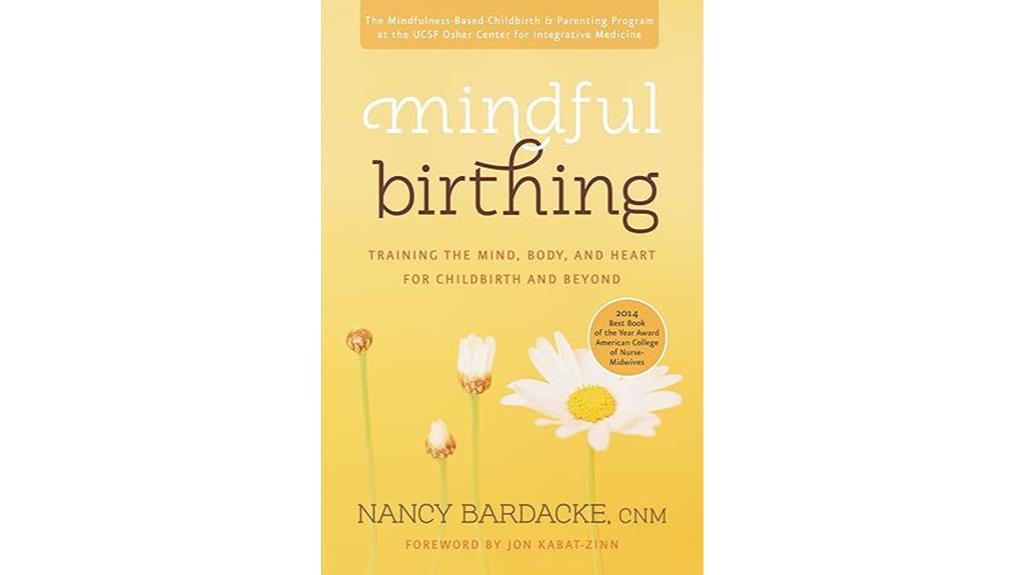
Ideal for expecting parents seeking a holistic approach to childbirth and mindfulness techniques, 'Mindful Birthing' provides valuable tools for managing the birthing experience and beyond. This book has been praised for easing worries surrounding childbirth and offering practical strategies for labor and delivery.
Readers appreciated the non-judgmental approach and found the mindfulness techniques instrumental in staying calm and composed during birth. 'Mindful Birthing' comes highly recommended for expecting mothers and their partners, with many highlighting its effectiveness for various types of births, including medication-free deliveries and VBACs.
Additionally, the book includes guidance on postpartum mindfulness, aiding readers in staying present and managing stress during the initial months of parenting. With positive feedback on its impact on birth experiences, 'Mindful Birthing' is a valuable resource for those seeking a mindful approach to childbirth and beyond.
Best For: Expecting parents looking for a comprehensive guide to mindfulness techniques and holistic approaches to childbirth and parenting.
Pros:
- Offers practical tools and strategies for managing the birthing experience.
- Non-judgmental approach appreciated by readers with different birth experiences.
- Includes guidance on postpartum mindfulness to assist in staying present and reducing stress during early parenting.
Cons:
- Some readers may find the mindfulness techniques challenging to implement consistently.
- May not cater to individuals who prefer a more traditional, medical-focused approach to childbirth.
- Limited focus on specific medical interventions or complications that may arise during childbirth.
Mindful Parenting for ADHD Children
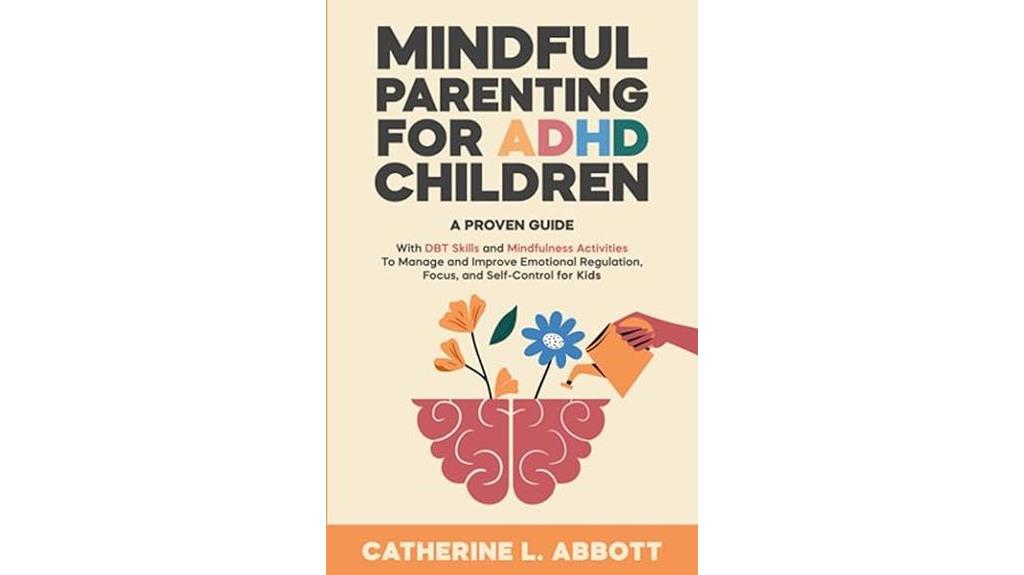
Ideal for parents seeking practical strategies to support children with ADHD, Mindful Parenting Books offer valuable insights and coping mechanisms. These books provide a holistic understanding of ADHD, covering symptoms, causes, and diagnosis. They equip parents with practical tools such as DBT skills and mindfulness activities to help children manage emotional regulation, focus, and self-control effectively.
Readers recommend these books not only for parents but also for foster parents, teachers, and individuals working with children dealing with ADHD. Personal experiences shared by readers highlight how these books have helped them navigate the challenges of raising children with ADHD, offering practical strategies and valuable coping mechanisms.
By promoting self-awareness, self-control, effective communication, and nurturing environments, Mindful Parenting Books play a significant role in fostering harmonious relationships between parents and children with ADHD.
Best For: Parents, foster parents, teachers, and individuals working with children with ADHD seeking practical tools and insights to support emotional regulation and self-control.
Pros:
- Comprehensive understanding of ADHD, including symptoms, causes, and diagnosis.
- Practical tools like DBT skills and mindfulness activities for managing emotional regulation and focus in children with ADHD.
- Empowers parents to create a nurturing environment fostering self-awareness and self-control in children with ADHD.
Cons:
- Subjective nature of content may not resonate with all readers.
- Similar strategies may be available online for free, raising concerns about the book's unique value.
- Some readers may find the content repetitive or lacking in depth in certain areas.
Mindful Parenting Book
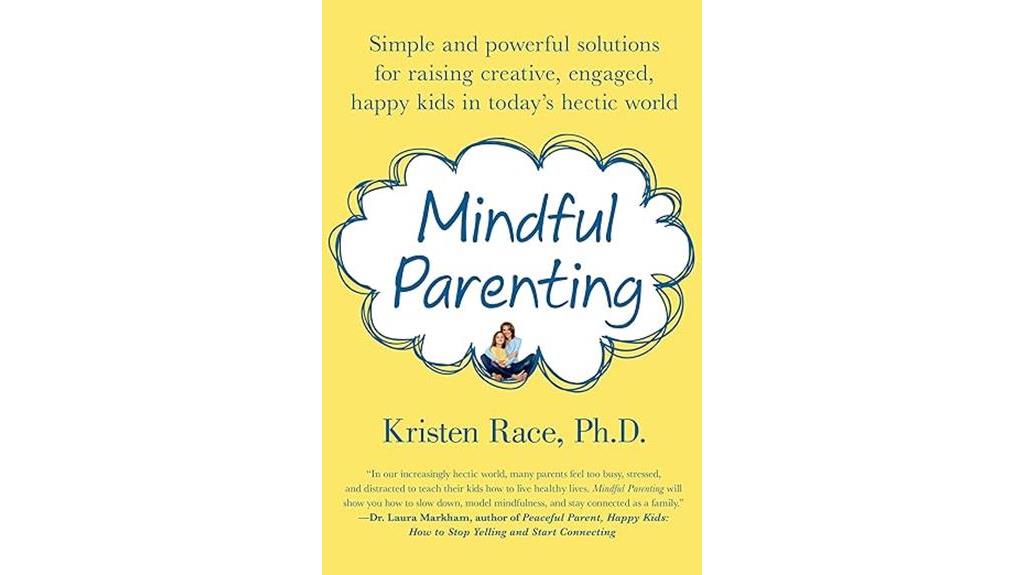
For parents seeking practical and science-backed strategies to explore mindfulness in their parenting approach, this book offers valuable insights and actionable advice. With numerous positive reviews praising its eye-opening content and practicality, this book seems to resonate with a wide range of readers.
It not only delves into understanding why children react the way they do but also provides tips for managing stress and improving mindfulness. Backed by scientific evidence, each chapter offers a blend of research-based information and mindfulness techniques, making it accessible even to those unfamiliar with complex biological concepts.
The book's practical suggestions and easy application have garnered recommendations from various readers, highlighting its global relevance beyond just American audiences. Whether you're a parent, grandparent, or anyone working with children, this book seems to offer a detailed guide to incorporating mindfulness into your parenting journey.
Best For: Parents and caregivers looking for practical, science-backed strategies to integrate mindfulness into their parenting approach.
Pros:
- Offers valuable insights and actionable advice for understanding children's behavior and managing stress.
- Backed by scientific evidence, providing a blend of research-based information and mindfulness techniques.
- Practical suggestions and easy application make it accessible to a wide range of readers, including those unfamiliar with complex biological concepts.
Cons:
- May not delve deep enough into certain advanced parenting topics.
- Could benefit from more diverse perspectives and cultural considerations.
- Some readers may find the content repetitive or overly simplistic.
Mindful Discipline: A Loving Approach to Setting Limits and Raising an Emotionally Intelligent Child
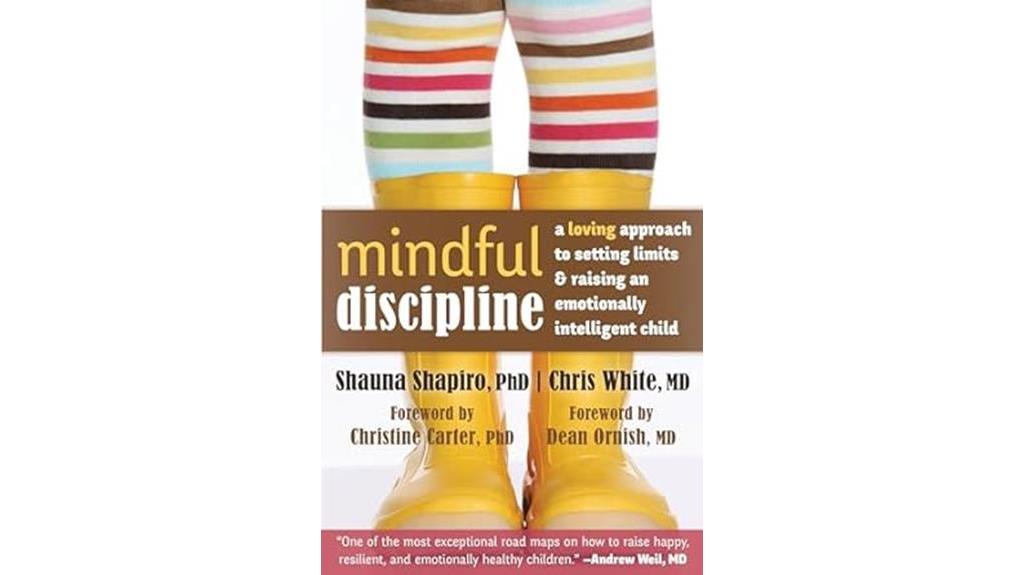
Best suited for parents seeking to incorporate mindfulness and loving discipline in their parenting approach, 'Mindful Discipline: A Loving Approach to Setting Limits and Raising an Emotionally Intelligent Child' offers practical strategies and insights for nurturing emotionally intelligent children. The book is praised for its common-sense approach, providing readers with tangible examples to follow.
By emphasizing mindfulness and balanced discipline, it equips parents with tools to raise children who are emotionally adept. Mindfulness benefits highlighted in the book include improved emotional regulation and resilience for both parents and children.
Readers appreciate the easy-to-implement strategies for setting boundaries and fostering a harmonious home environment. Though some desire more hands-on tips, the academic foundation of the book ensures a well-balanced and science-based approach to mindful parenting.
Best For: Parents looking to incorporate mindfulness and loving discipline in their parenting approach to raise emotionally intelligent children.
Pros:
- Practical strategies and tangible examples provided for nurturing emotionally intelligent children.
- Emphasis on mindfulness and balanced discipline to equip parents with effective tools.
- Easy-to-implement strategies for setting boundaries and fostering a harmonious home environment.
Cons:
- Some readers desire more hands-on tips and examples.
- Need for alternative strategies if initial suggestions do not work smoothly.
- Lack of practical advice and examples may leave some readers feeling the book falls short of expectations.
Parenting from the Inside Out: How a Deeper Self-Understanding Can Help You Raise Children Who Thrive

With its focus on deeper self-understanding to enhance parenting skills, 'Parenting from the Inside Out' is a valuable resource for those seeking to cultivate a strong and nurturing relationship with their children.
This book explores the importance of understanding one's own past and emotions to become a better parent. By investigating how our upbringing influences our parenting style, 'Parenting from the Inside Out' offers a fresh perspective on raising children.
It emphasizes the significance of healing past wounds and developing a deeper self-awareness to create a more empathetic and understanding environment for our children to thrive.
Through personal insights from professionals and scientific references, this book provides practical tools for self-growth and fostering stronger parent-child relationships.
If you're looking to enhance your parenting skills through inner reflection and understanding, 'Parenting from the Inside Out' is a must-read.
Best For: Individuals seeking to improve their parenting skills through deeper self-understanding and healing past wounds.
Pros:
- Offers valuable insights on how personal history influences parenting style.
- Provides practical tools and exercises for self-growth and fostering better parent-child relationships.
- Backed by personal insights from professionals and referenced scientific material for a comprehensive understanding.
Cons:
- May require a significant amount of introspection and emotional work.
- Some readers might find the psychological concepts challenging to grasp initially.
- Not a quick-fix solution and requires ongoing commitment to personal growth and reflection.
Under the Chinaberry Tree: Books and Inspirations for Mindful Parenting

When considering books for mindful parenting, exploring 'Under the Chinaberry Tree' can provide valuable insights and inspirations for traversing the journey of raising young children. This book has garnered positive reviews for its comforting and valuable content, appreciated by fans of Chinaberry's offerings.
Ann's wisdom and humor shine through, making it a recommended read for all parents of young children. Despite some critiques about its focus on specific age groups and design elements, the book's teachings on parenting from the heart and soul have left a lasting impact on readers.
Through personal growth and a unique perspective, 'Under the Chinaberry Tree' has influenced many to become better parents. Sharing personal experiences and recommendations, this book serves as a guiding light for mindful parenting.
Best For: Parents seeking valuable insights and inspirations for mindful parenting to navigate the journey of raising young children.
Pros:
- Offers comforting and valuable content appreciated by fans of Chinaberry's offerings.
- Provides teachings on parenting from the heart and soul, impacting personal growth and perspective.
- Recommended read for all parents of young children, influencing better parenting skills.
Cons:
- Critiques regarding the focus on specific age groups in the book.
- Some children may not find recommended books appealing.
- Design elements such as detailed illustrations and the green typeface may impact engagement and readability.
Growing Up Mindful
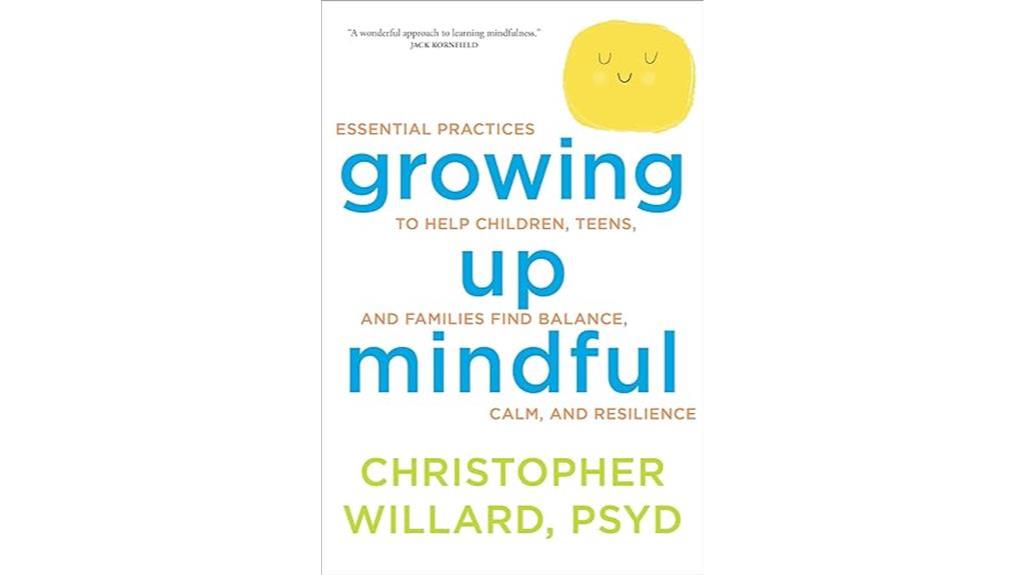
For parents, teachers, therapists, caregivers, or anyone interested in sharing mindfulness with children, 'Growing Up Mindful' offers easily implemented practices and a positive outlook on teaching mindfulness to kids. This book provides a variety of practical suggestions that are clear, easy to follow, and suitable for individuals at all experience levels.
It includes a helpful chart showcasing the positive impact of regular mindfulness practice, making it a valuable resource for those looking to introduce mindfulness into children's lives. With a writing style that's genuine and easy to understand, 'Growing Up Mindful' incorporates mindful interludes for experiential learning, enhancing the overall reading experience.
Users have praised this book as one of the best resources for teaching mindfulness to children, making it a must-have for anyone interested in incorporating mindfulness practices into their families or classrooms.
Best For: Parents, educators, therapists, and caregivers seeking a comprehensive and user-friendly guide for teaching mindfulness to children.
Pros:
- Easily implemented practices suitable for beginners and experienced individuals.
- Genuine writing style with mindful interludes for experiential learning.
- Positive impact chart showcasing the benefits of regular mindfulness practice.
Cons:
- Some users reported receiving books with stains upon arrival.
- One user recommended purchasing the physical copy over the digital version.
- Limited mention of potential challenges or obstacles in implementing mindfulness practices with children.
Practicing Mindfulness: 75 Essential Meditations to Reduce Stress, Improve Mental Health, and Find Peace
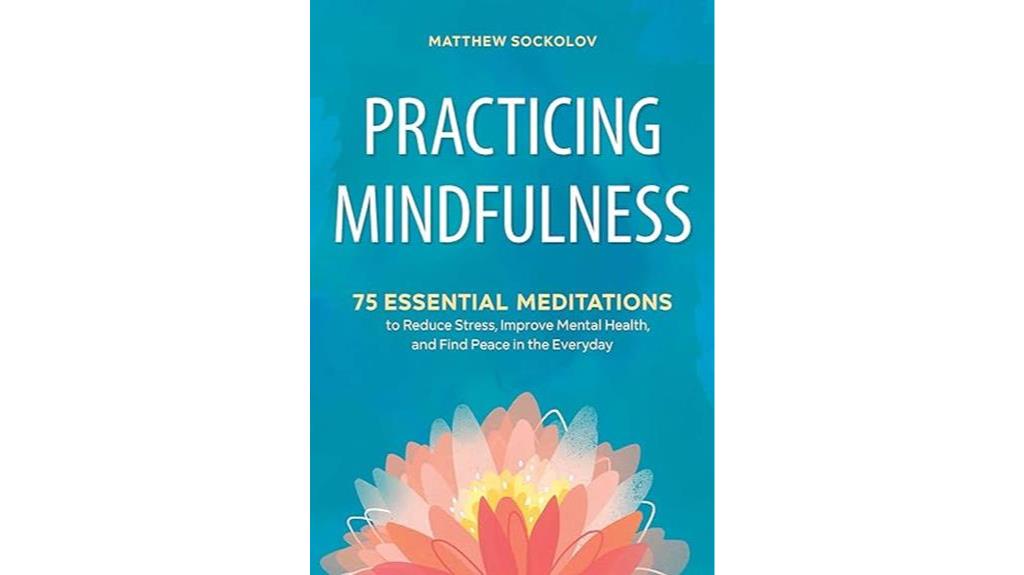
Ideal for busy parents seeking quick and effective mindfulness practices, 'Practicing Mindfulness: 75 Essential Meditations to Reduce Stress, Improve Mental Health, and Find Peace' offers accessible techniques tailored for daily use. This book by Mathew Sockolov presents a wide range of meditation approaches designed to fit into even the busiest schedules, with sessions lasting between 5 to 20 minutes.
It covers areas such as basic mindfulness exercises, everyday mindfulness, and mindful moods, making it a thorough guide for self-improvement through meditation. Readers have praised its simplicity, readability, and practicality in incorporating meditation into their daily routines.
Whether you're new to mindfulness or a seasoned practitioner, this book provides valuable resources for managing emotions and stress effectively in everyday life.
Best For: Individuals with busy schedules seeking accessible and effective mindfulness practices.
Pros:
- Offers a wide range of meditation approaches suitable for daily use.
- Simple and practical exercises that take little time to complete.
- Comprehensive guide covering various areas for self-improvement through meditation.
Cons:
- Some may find the meditation ideas presented overly simplistic.
- Content may not be deemed substantial enough for certain preferences.
- A perception of the material being more suitable for a blog post or series rather than a book.
The Book of Joy: Lasting Happiness in a Changing World

Exploring 'The Book of Joy: Lasting Happiness in a Changing World' offers valuable insights for parents seeking to cultivate compassion and empathy in their parenting journey. Published in 2016, this book documents a remarkable week-long meeting between the Dalai Lama and Archbishop Desmond Tutu, focusing on the pursuit of joy amidst life's challenges.
Divided into three parts, it covers the essence of true joy, the barriers to joy, and the pillars of joy. Delving into topics like suffering, forgiveness, and compassion, the book provides practical advice on finding happiness and maintaining mental well-being.
Readers appreciate the wisdom, humor, and depth of humanity portrayed in this book, making it a recommended read for those looking to enhance their personal growth and embrace joy in an ever-changing world.
Best For: Parents seeking to instill compassion and empathy in their parenting journey through profound insights on joy and resilience.
Pros:
- Offers practical advice on finding happiness and maintaining mental well-being.
- Delightful blend of wisdom, humor, and humanity.
- Insightful exploration of joy amidst life's challenges.
Cons:
- May require reflection and introspection, which can be time-consuming.
- Some readers may find the content emotionally intense.
- Not a quick-fix solution for immediate happiness.
Beginners Guide on Parenting Children with ADHD: Modern Approach to Understanding and Leading Hyperactive Child to Success

When seeking a practical and insightful guide on parenting children with ADHD, 'Mindful Parenting Books' stands out as a valuable resource. This book has garnered positive reviews for its helpful content and modern approach to dealing with ADHD.
While it may lack concrete suggestions on how to help kids with ADHD according to some critics, it's still praised for its clear and concise style, making it great for beginners. Some readers appreciate the perspective offered by the knowledgeable author, although a few feel it could benefit from more practical advice.
Overall, the book emphasizes the importance of wise parenting in guiding ADHD children and incorporates successful therapy methods that have been well-received. Published in 2021, it provides up-to-date information compared to older resources.
Best For: Parents seeking a modern and beginner-friendly approach to understanding and guiding children with ADHD.
Pros:
- Provides valuable content and a modern approach to dealing with ADHD.
- Clear and concise, great for beginners.
- Emphasizes the importance of wise parenting in guiding ADHD children.
Cons:
- Lacks concrete suggestions on how to help kids with ADHD.
- Some find it upsetting to refer to ADHD as an illness.
- Needs more practical advice on what to do instead of what not to do.
Being at Your Best When Your Kids Are at Their Worst: Practical Compassion in Parenting
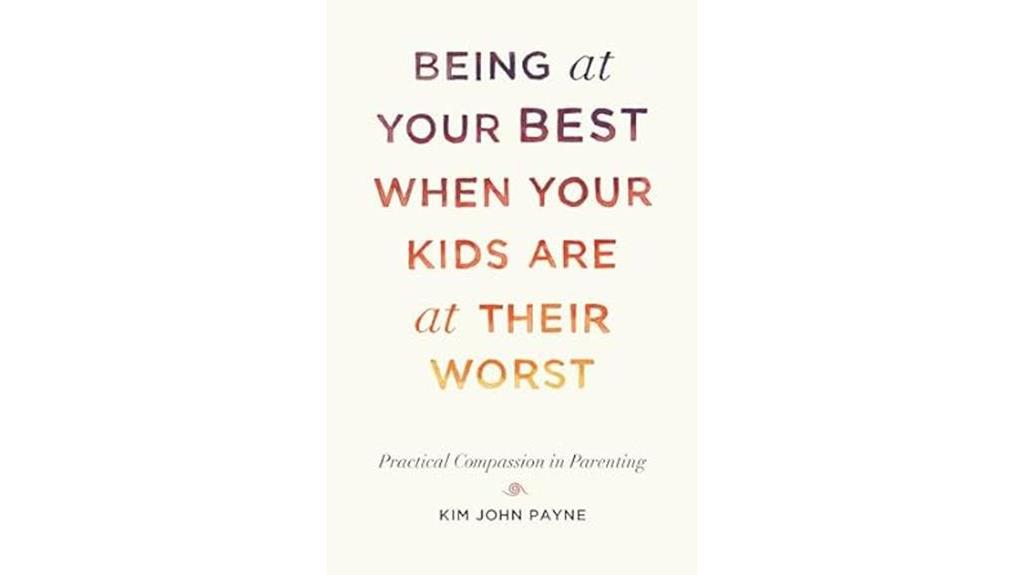
For parents seeking practical guidance on maintaining composure and showing compassion during challenging parenting moments, 'Being at Your Best When Your Kids Are at Their Worst: Practical Compassion in Parenting' stands out as a valuable resource. This book has garnered positive reviews and recommendations for its practical advice and approachable writing style. Readers appreciate the concise and helpful nature of the content, along with the author's use of personal experiences in education.
Despite these strengths, some concerns have been raised regarding the book's applicability to children with attachment issues like Reactive Attachment Disorder. Additionally, a few readers feel that the parenting approaches presented may oversimplify complex behavioral challenges.
However, the book's focus on compassion and empowering parenting techniques remains a highlight, with many sharing how it has helped improve their relationships with their children and reduce conflicts within the family.
Best For: Parents looking for practical and compassionate parenting guidance during challenging moments with their children.
Pros:
- Practical advice and approachable writing style.
- Concise and helpful content with practical tools for parenting.
- Focus on compassion and empowering parenting techniques.
Cons:
- Lack of accommodation for children with attachment issues like Reactive Attachment Disorder.
- Oversimplification of parenting approaches may not suit children with deep behavioral challenges.
- Heavy use of metaphors and catchphrases in the book.
Parenting at Your Best: Powerful Reflections and Straightforward Tips for Becoming a Mindful Parent
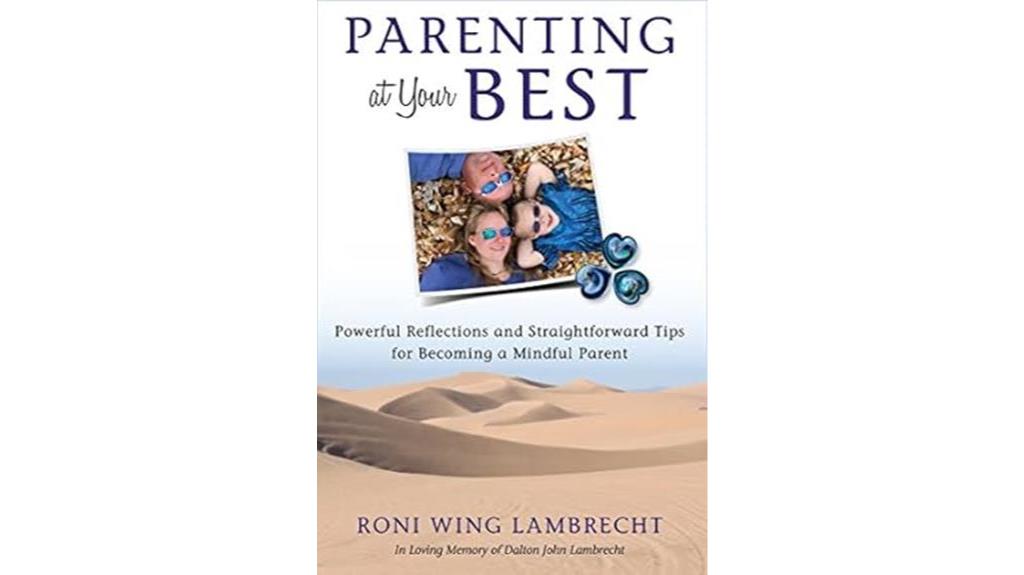
This book, Parenting at Your Best, is a valuable resource for new and soon-to-be parents as well as those who've experienced loss, offering powerful reflections and practical tips for mindful parenting.
Written by Roni Wing Lambrecht, the book draws from the author's personal journey through grief after losing her teenage son, Dalton. It emphasizes the importance of intentional parenting and treasuring moments with our children.
The book focuses on making each parenting moment meaningful, highlighting the significance of respect in parent-child relationships. It provides straightforward and down-to-earth advice, promoting inclusivity and open communication within families.
Readers have found the book to evoke a range of emotions, from smiles to tears, while offering practical and heartfelt guidance for reflecting on parenting approaches.
Overall, Parenting at Your Best is praised for its sincerity, practicality, and ability to resonate with parents looking to enhance their parenting skills.
Best For: Parents looking to enhance their parenting skills and embrace mindful parenting practices.
Pros:
- Offers powerful reflections and practical tips for mindful parenting.
- Written by an author who shares personal experiences and wisdom.
- Emphasizes the value of respect in parent-child relationships.
Cons:
- May evoke strong emotional responses in readers, including tears.
- Focuses on grief and loss, which may be challenging for some readers.
- Some readers may find the approach too sentimental or emotional.
The Mindful Parent
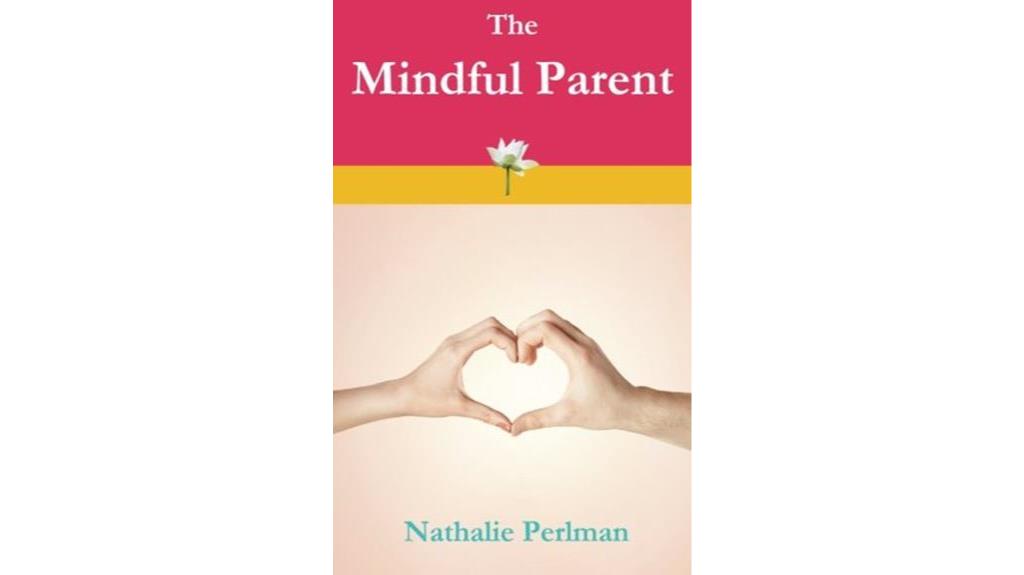
Exploring 'The Mindful Parent' offers valuable insights and practical strategies for parents seeking to cultivate stronger parent-child relationships through mindfulness. This book emphasizes the importance of shifting one's mindset to enhance the dynamics with their children.
It provides actionable tips on incorporating mindfulness into parenting practices to foster better connections and personal development. Despite a few typographical errors, readers have generally appreciated the informative and concise nature of the book.
Readers commend it as essential reading for all parents, praising its ability to offer guidance and help them embrace their parental responsibilities. While some readers have noted the need for better editing and felt the book leaned too heavily on promoting mindful parenting, overall, it's recommended for those looking to enrich their parenting journey with mindfulness principles.
Best For: Parents looking to deepen their bond with their children through mindful practices.
Pros:
- Offers practical tips for applying mindfulness to parenting.
- Emphasizes the importance of changing one's mindset for better parent-child relationships.
- Provides insightful information for personal growth and enhancing parenting skills.
Cons:
- Contains typographical errors that may be distracting.
- Some readers feel it focuses too much on selling the concept of mindful parenting.
- Implementation tips could be more extensive for practical application.
Factors to Consider When Choosing Mindful Parenting Books

When selecting mindful parenting books, it's crucial to take into account key selection criteria such as the author's expertise and the book's reputation.
Assessing the content, reader engagement levels, and practical application tips within the book can help ascertain its usefulness for your parenting journey.
Search for impactful parenting techniques that align with your values and parenting style to make the most of your reading experience.
Key Selection Criteria
Taking into account the author's background and expertise in parenting, mindfulness, or child psychology is vital when selecting mindful parenting books. Authors with experience in these areas are more likely to provide valuable insights and practical advice that can resonate with your parenting journey.
It's essential to look for books that offer practical tips, techniques, and strategies for mindful parenting, as these can be directly applied to your daily interactions with your children. Checking for recommendations or reviews from other parents, educators, or professionals in the field can also give you a better understanding of the book's effectiveness and relevance.
Consider the specific focus of the book, such as ADHD parenting, emotional intelligence, or mindfulness practices, to make sure it aligns with your current needs and challenges. Evaluating the readability and engaging nature of the book is important to make sure that it complements your parenting style and preferences, making the learning process more enjoyable and effective.
Book Content Evaluation
Considering the practicality and relevance of the content is essential when selecting mindful parenting books. It's important to evaluate the depth of insights and wisdom shared by the authors, as well as the presence of personal experiences and relatable anecdotes within the book.
Additionally, looking at how the content aligns with your specific parenting needs and challenges is crucial. Examining the author's background and expertise can provide insight into the basis of their advice, helping you determine the credibility of the information presented.
When evaluating book content, focus on practical tips and strategies offered for implementing mindful parenting, seeking a balance between theory and actionable guidelines. Consider whether the information provided aligns with your parenting goals and values, and if the book addresses common parenting challenges relevant to your family dynamics.
Checking reader feedback can also offer valuable insights into how the book's content has helped others improve their parenting skills and relationships with their children.
Reader Engagement Levels
To choose mindful parenting books effectively, it's important to assess the levels of reader engagement, which play a significant role in the book's impact on implementing mindfulness techniques in parenting.
Engaging content is crucial as it keeps readers interested and motivated to apply the teachings within the book. Interactive elements such as exercises, worksheets, and reflection prompts can enhance engagement by encouraging active participation. Additionally, personal anecdotes and relatable stories can resonate with readers, making the content more relatable and engaging.
Books that offer practical, actionable advice tend to engage readers more effectively in applying mindfulness techniques in parenting situations. Reader engagement levels can be gauged by the emotional responses evoked, such as tears, inspiration, and reflection. Positive feedback from readers praising the book's impact and practical advice is a strong indicator of high engagement levels.
Furthermore, personal experiences shared by readers and recommendations based on practicality and value demonstrate a deep connection and high level of engagement with the book's content.
Practical Application Tips
Practical application tips found in mindful parenting books serve as invaluable resources for parents seeking to implement mindfulness techniques in their day-to-day interactions with their children. These tips offer step-by-step guidance on applying mindfulness practices in various parenting challenges. They provide concrete strategies for enhancing self-awareness, managing emotions, and fostering positive communication with kids. Often, these tips include exercises, reflection prompts, and real-life examples to illustrate effective mindful parenting.
Impactful Parenting Techniques
When choosing mindful parenting books, it's essential to ponder the specific impactful parenting techniques they offer to enhance your relationship with your child.
Effective parenting techniques focus on building strong parent-child relationships and fostering emotional intelligence. Mindful parenting involves practicing self-awareness, empathy, and compassion towards oneself and children.
Techniques such as active listening, setting boundaries with empathy, and modeling positive behaviors are key in mindful parenting. Mindfulness practices like deep breathing, meditation, and self-reflection help parents respond calmly to challenging situations.
These techniques promote emotional regulation, communication skills, and positive behavior modeling for children.
Building strong parent-child relationships based on respect, open communication, and emotional connection is vital.
Being present in the moment, actively listening to your children, setting boundaries with love and consistency, and encouraging self-awareness and emotional regulation are fundamental in mindful parenting.
Positive discipline strategies that prioritize teaching and guiding children are also emphasized.
Frequently Asked Questions
How Can Mindful Parenting Help With Managing ADHD in Children?
Mindful parenting can benefit children with ADHD by fostering increased self-awareness and emotional regulation. By practicing mindfulness techniques, parents can help children manage impulsivity and improve attention span.
Mindful parenting also promotes open communication, patience, and empathy, which are essential in supporting children with ADHD. Setting clear boundaries and consistent routines in a mindful manner can create a stable environment that aids in managing ADHD symptoms effectively.
What Are the Key Differences Between Mindful Discipline and Traditional Discipline?
Mindful discipline emphasizes understanding a child's emotions and encourages positive behavior through communication. Traditional discipline often focuses on punishment and obedience.
By fostering empathy and connection, mindful discipline builds a child's self-regulation skills and strengthens the parent-child bond. In contrast, traditional discipline may lead to power struggles and resentment.
Incorporating mindfulness techniques, such as deep breathing and active listening, can enhance the effectiveness of discipline strategies and promote a harmonious parent-child relationship.
How Can Mindfulness Practices Benefit Parents During Childbirth and Beyond?
Mindfulness practices offer parents invaluable tools during childbirth and beyond. By cultivating present moment awareness and non-judgmental acceptance, parents can navigate the challenges of labor with greater calm and focus.
Post-birth, mindfulness aids in managing stress, enhancing bonding with the newborn, and fostering emotional resilience. This practice enables parents to respond to their child's needs mindfully, promoting healthy relationships and effective communication.
Ultimately, mindfulness supports parental well-being and nurtures a harmonious family dynamic.
Are There Specific Mindfulness Techniques Tailored for Raising Emotionally Intelligent Children?
Mindfulness techniques can be adapted to nurture emotionally intelligent children. Practices like active listening, empathy modeling, and teaching emotional regulation skills are key.
Mindful breathing exercises can help kids manage big emotions. Setting a calm environment and encouraging open communication foster emotional intelligence.
How Do Mindful Parenting Books Contribute to Self-Understanding and Improved Parent-Child Relationships?
Mindful parenting books serve as guiding lights, illuminating the path to self-discovery and deeper parent-child connections. By delving into these insightful texts, one can uncover hidden aspects of themselves and understand how their actions influence relationships.
These resources offer practical tools and perspectives that foster empathy, communication, and mutual respect within families. Through self-reflection and newfound knowledge, parents can cultivate stronger bonds with their children, nurturing understanding and harmony in their interactions.
Are the Books in the Mindful Parenting List Still Relevant and Worth Reading in 2024?
Looking for the best parenting books in 2024? The books in the Mindful Parenting list are still relevant and worth reading. With timeless advice on raising children in the digital age, fostering empathy, and maintaining a balanced family life, these books remain essential for parents navigating the challenges of modern parenting.
Conclusion
As parents, we're like gardeners nurturing our children, planting seeds of mindfulness and compassion. By reading the best mindful parenting books, we equip ourselves with the tools to cultivate a peaceful and harmonious environment for our families to thrive.
Just as a well-tended garden flourishes with care and attention, so too can our children bloom into resilient and compassionate individuals with the guidance provided by these insightful books.
-

 Parenting Styles1 week ago
Parenting Styles1 week agoWorst Parenting Style: Impact on Child Development
-

 Parenting Styles1 week ago
Parenting Styles1 week ago2023 Indiana Parenting Time Guidelines Update
-

 Vetted7 days ago
Vetted7 days ago15 Best Books on Step Parenting Every Blended Family Needs to Read
-

 Parenting Tips6 days ago
Parenting Tips6 days agoUnequal Responsibilities: When One Parent Does All the Parenting
-

 Parenting Tips1 week ago
Parenting Tips1 week agoFostering Love: How Much Do You Get Paid for Foster Parenting?
-

 Vetted6 days ago
Vetted6 days ago15 Best Parenting Books of All Time Every Parent Should Read
-

 Vetted20 hours ago
Vetted20 hours ago15 Best Co-Parenting Books Every Parent Should Read for Successful Co-Parenting
-

 Vetted6 days ago
Vetted6 days ago15 Best Books for Gentle Parenting Every Parent Should Read

















